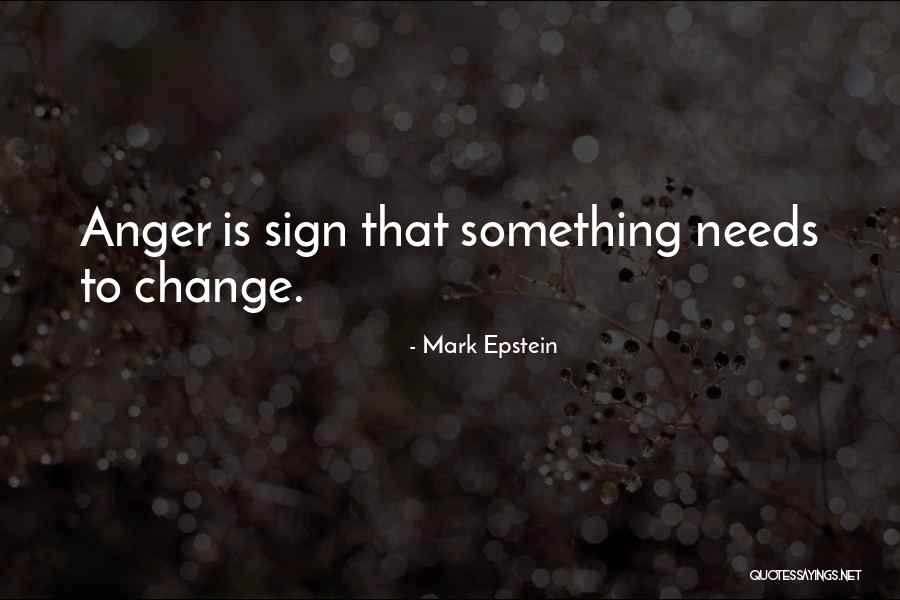Mark Epstein Quotes & Sayings
Enjoy the top 65 famous quotes, sayings and quotations by Mark Epstein.
Famous Quotes By Mark Epstein
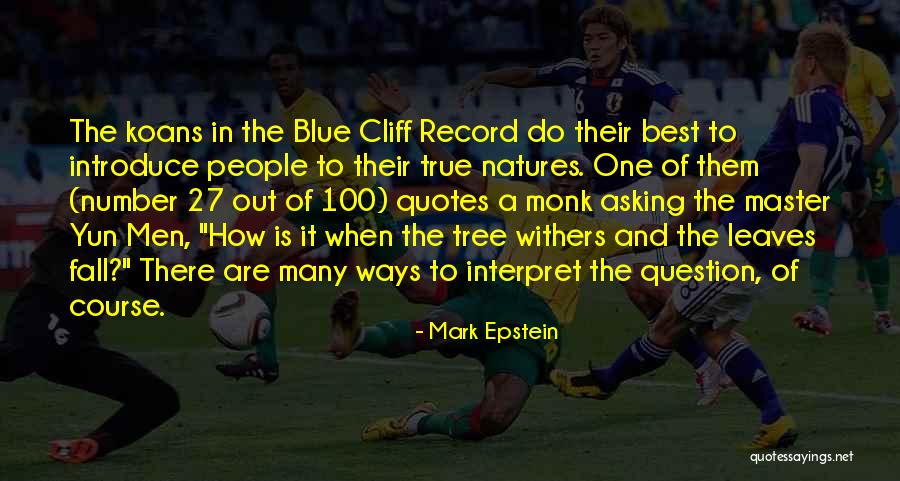
The koans in the Blue Cliff Record do their best to introduce people to their true natures. One of them (number 27 out of 100) quotes a monk asking the master Yun Men, "How is it when the tree withers and the leaves fall?" There are many ways to interpret the question, of course. — Mark Epstein
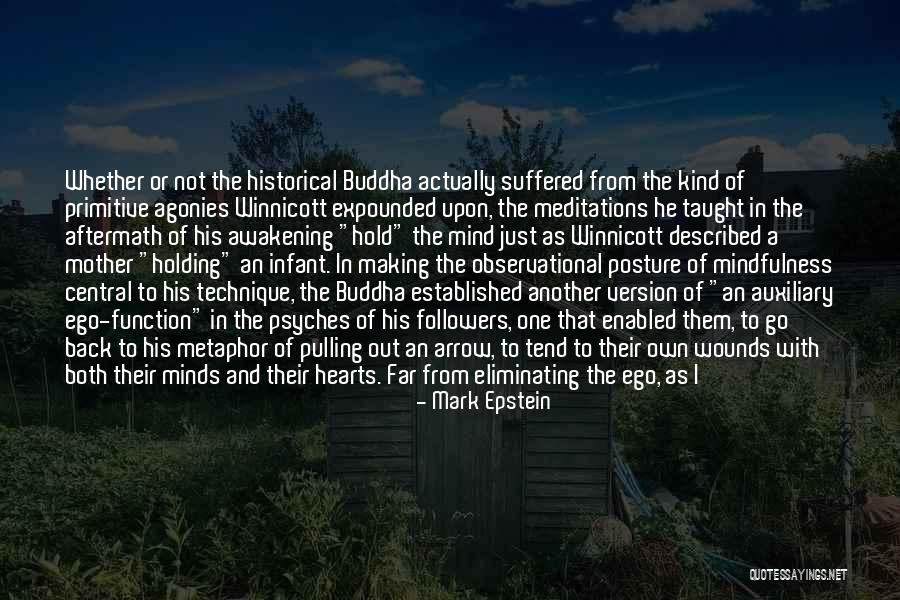
Whether or not the historical Buddha actually suffered from the kind of primitive agonies Winnicott expounded upon, the meditations he taught in the aftermath of his awakening "hold" the mind just as Winnicott described a mother "holding" an infant. In making the observational posture of mindfulness central to his technique, the Buddha established another version of "an auxiliary ego-function" in the psyches of his followers, one that enabled them, to go back to his metaphor of pulling out an arrow, to tend to their own wounds with both their minds and their hearts. Far from eliminating the ego, as I naively believed I should when I first began to practice meditation, the Buddha encouraged a strengthening of the ego so that it could learn to hold primitive agonies without collapse. — Mark Epstein
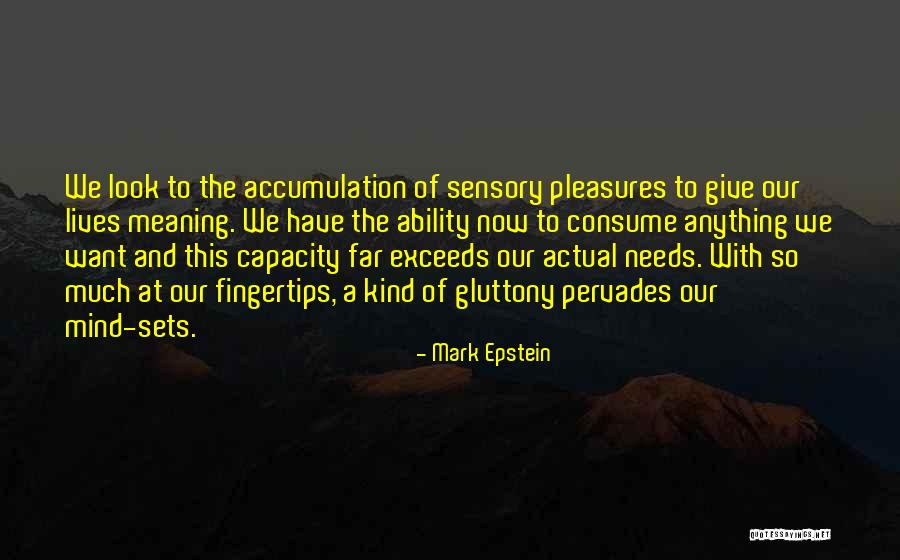
We look to the accumulation of sensory pleasures to give our lives meaning. We have the ability now to consume anything we want and this capacity far exceeds our actual needs. With so much at our fingertips, a kind of gluttony pervades our mind-sets. — Mark Epstein
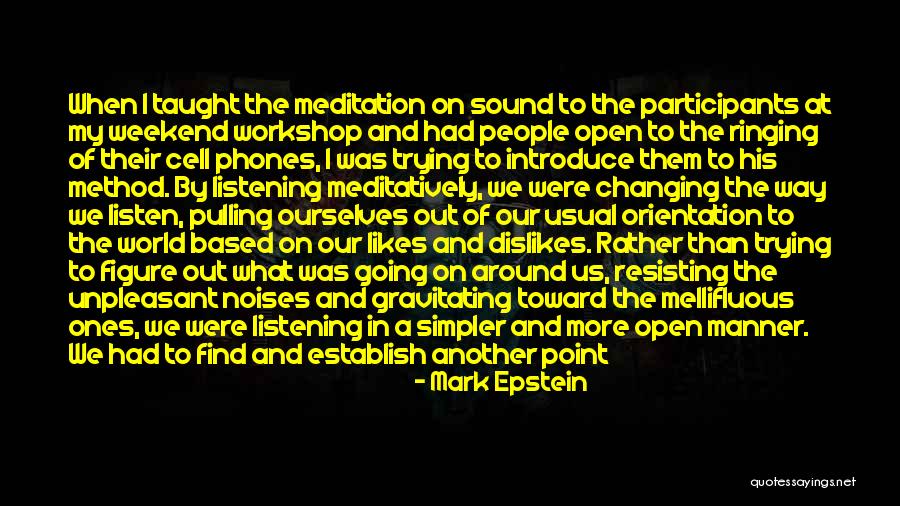
When I taught the meditation on sound to the participants at my weekend workshop and had people open to the ringing of their cell phones, I was trying to introduce them to his method. By listening meditatively, we were changing the way we listen, pulling ourselves out of our usual orientation to the world based on our likes and dislikes. Rather than trying to figure out what was going on around us, resisting the unpleasant noises and gravitating toward the mellifluous ones, we were listening in a simpler and more open manner. We had to find and establish another point of reference to listen in this way, one that was outside the ego's usual territory of control. You might say we were simply listening, but it was actually more complex than that. While listening, we were also aware of ourselves listening, and at the same time we were conscious of what the listening evoked within. Unhooked from our usual preoccupations, we were listening from a neutral place. — Mark Epstein
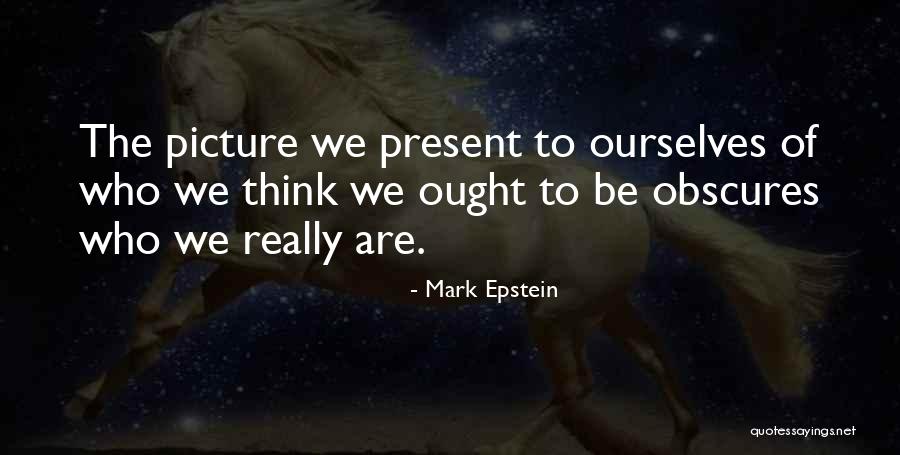
The picture we present to ourselves of who we think we ought to be obscures who we really are. — Mark Epstein
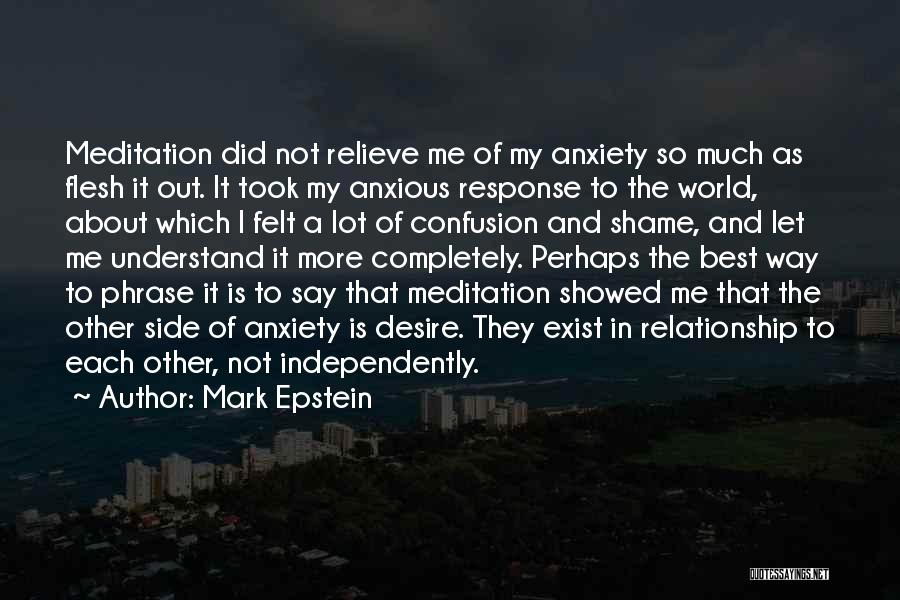
Meditation did not relieve me of my anxiety so much as flesh it out. It took my anxious response to the world, about which I felt a lot of confusion and shame, and let me understand it more completely. Perhaps the best way to phrase it is to say that meditation showed me that the other side of anxiety is desire. They exist in relationship to each other, not independently. — Mark Epstein
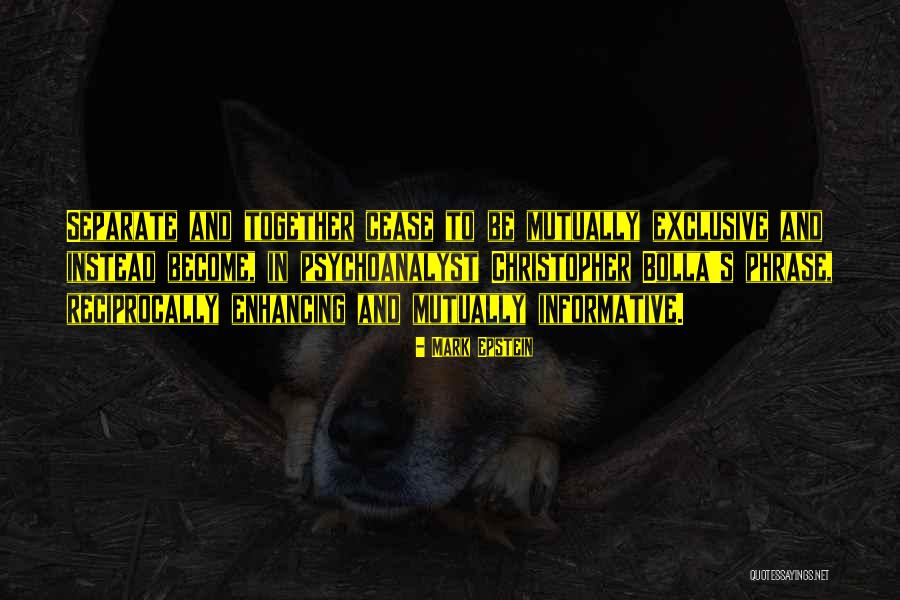
Separate and together cease to be mutually exclusive and instead become, in psychoanalyst Christopher Bolla's phrase, reciprocally enhancing and mutually informative. — Mark Epstein
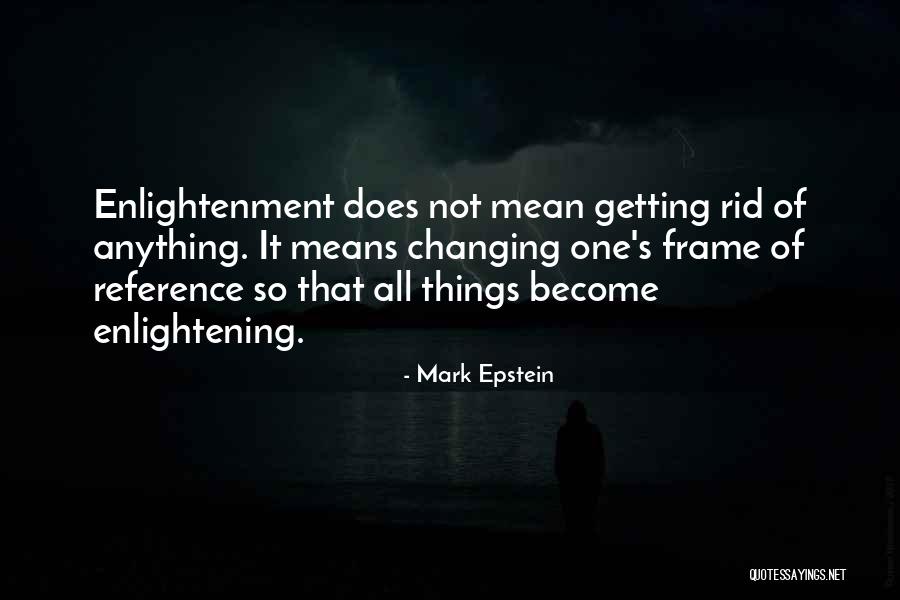
Enlightenment does not mean getting rid of anything. It means changing one's frame of reference so that all things become enlightening. — Mark Epstein
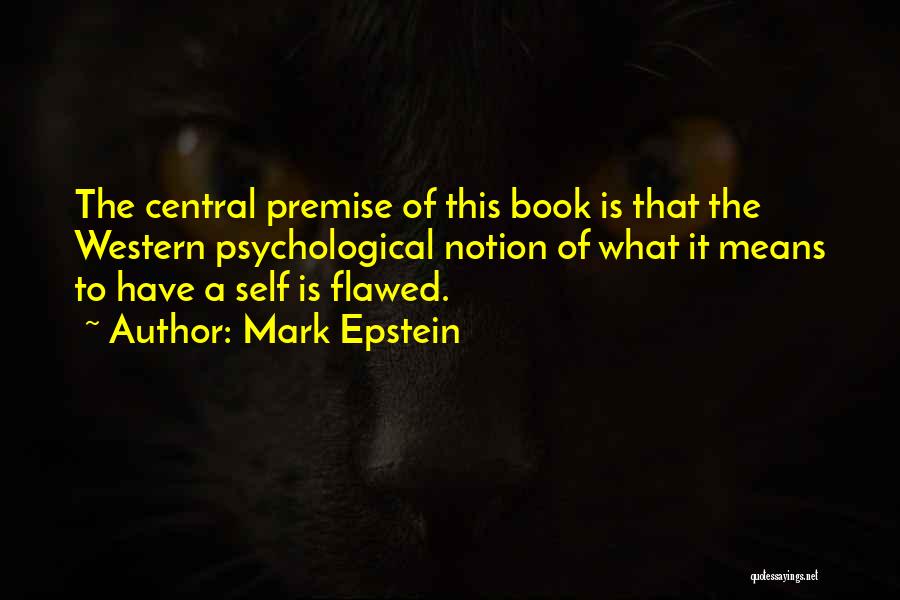
The central premise of this book is that the Western psychological notion of what it means to have a self is flawed. — Mark Epstein
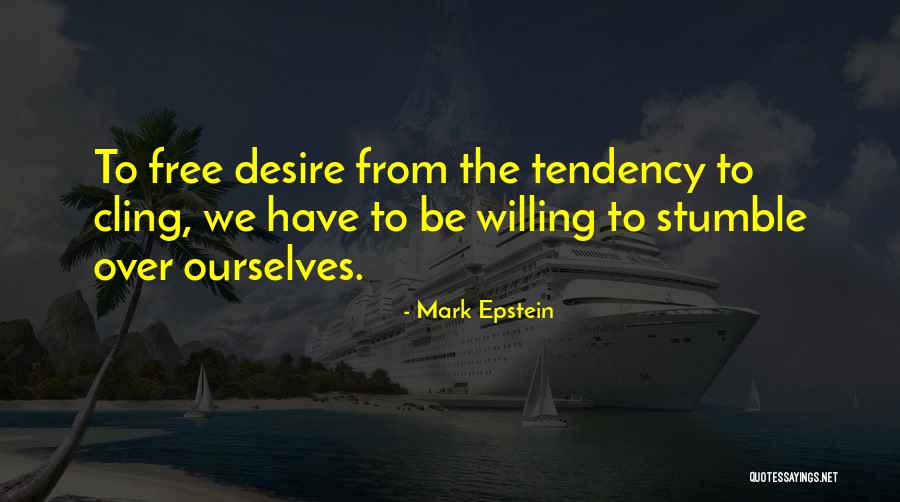
To free desire from the tendency to cling, we have to be willing to stumble over ourselves. — Mark Epstein
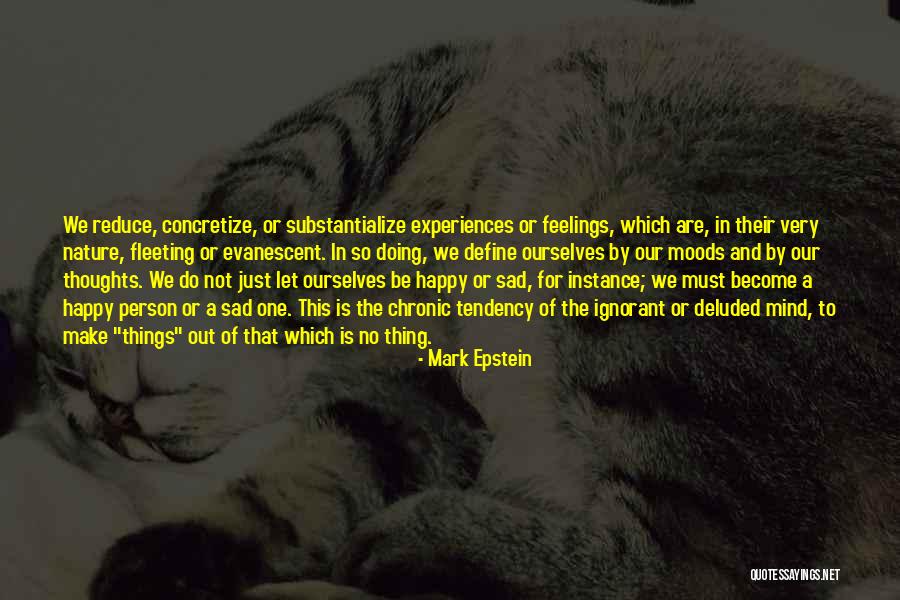
We reduce, concretize, or substantialize experiences or feelings, which are, in their very nature, fleeting or evanescent. In so doing, we define ourselves by our moods and by our thoughts. We do not just let ourselves be happy or sad, for instance; we must become a happy person or a sad one. This is the chronic tendency of the ignorant or deluded mind, to make "things" out of that which is no thing. — Mark Epstein

While the primary function of formal Buddhist meditation is to create the possibility of the experience of "being," my work as a therapist has shown me that the demands of intimate life can be just as useful as meditation in moving people toward this capacity. Just as in formal meditation, intimate relationships teach us that the more we relate to each other as objects, the greater our disappointment. The trick, as in meditation, is to use this disappointment to change the way we relate. — Mark Epstein
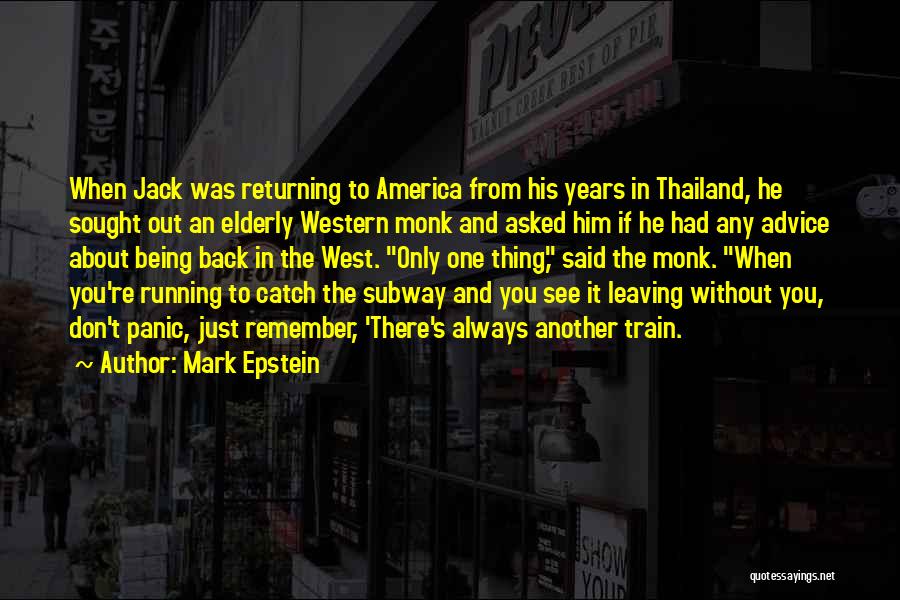
When Jack was returning to America from his years in Thailand, he sought out an elderly Western monk and asked him if he had any advice about being back in the West. "Only one thing," said the monk. "When you're running to catch the subway and you see it leaving without you, don't panic, just remember, 'There's always another train. — Mark Epstein
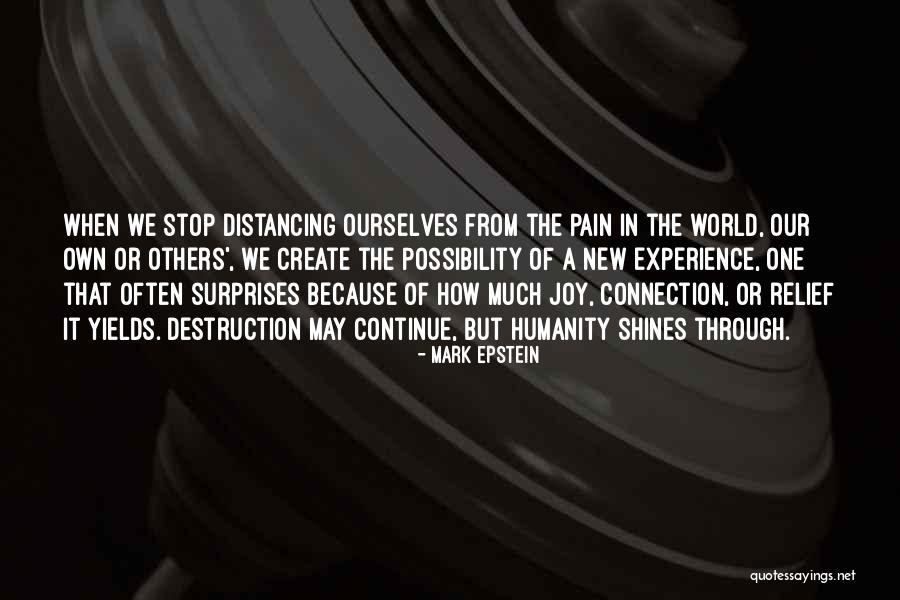
When we stop distancing ourselves from the pain in the world, our own or others', we create the possibility of a new experience, one that often surprises because of how much joy, connection, or relief it yields. Destruction may continue, but humanity shines through. — Mark Epstein
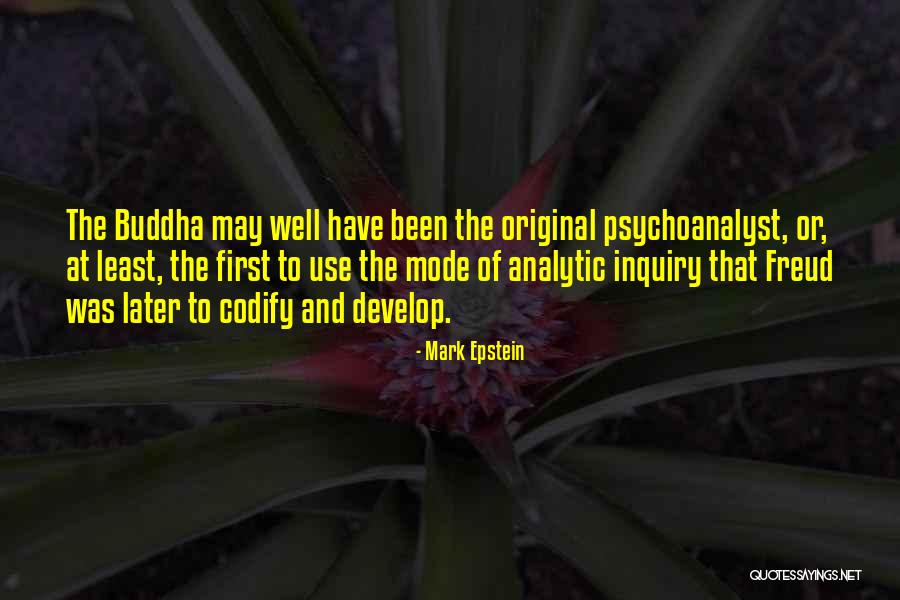
The Buddha may well have been the original psychoanalyst, or, at least, the first to use the mode of analytic inquiry that Freud was later to codify and develop. — Mark Epstein
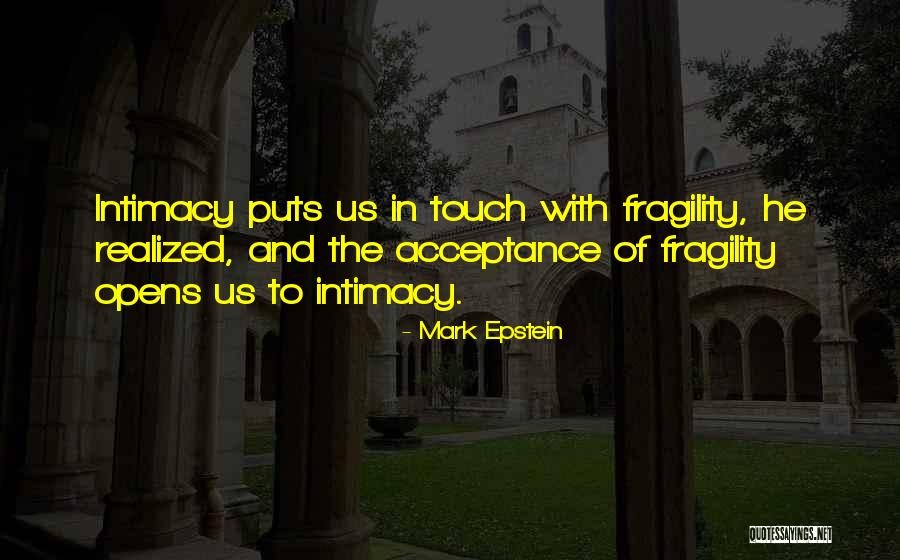
Intimacy puts us in touch with fragility, he realized, and the acceptance of fragility opens us to intimacy. — Mark Epstein
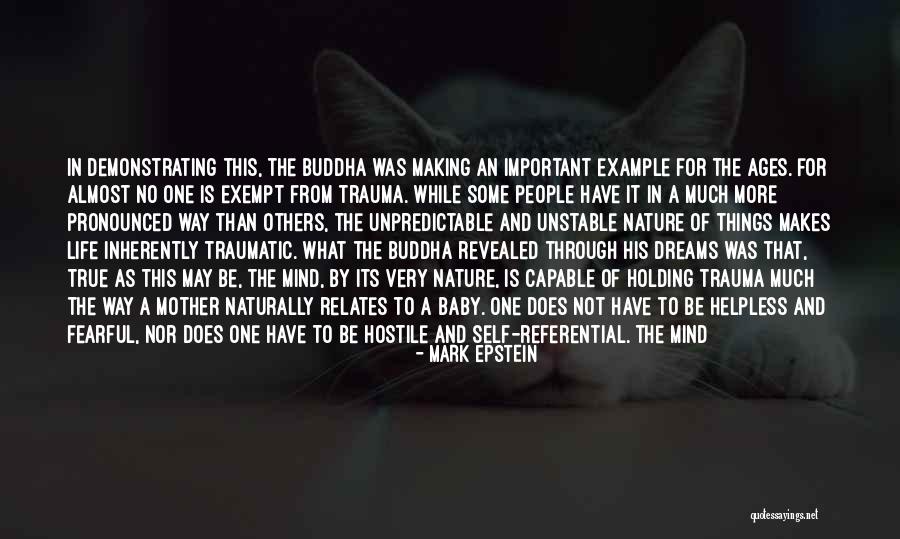
In demonstrating this, the Buddha was making an important example for the ages. For almost no one is exempt from trauma. While some people have it in a much more pronounced way than others, the unpredictable and unstable nature of things makes life inherently traumatic. What the Buddha revealed through his dreams was that, true as this may be, the mind, by its very nature, is capable of holding trauma much the way a mother naturally relates to a baby. One does not have to be helpless and fearful, nor does one have to be hostile and self-referential. The mind knows intuitively how to find a middle path. Its implicit relational capacity is hardwired. — Mark Epstein
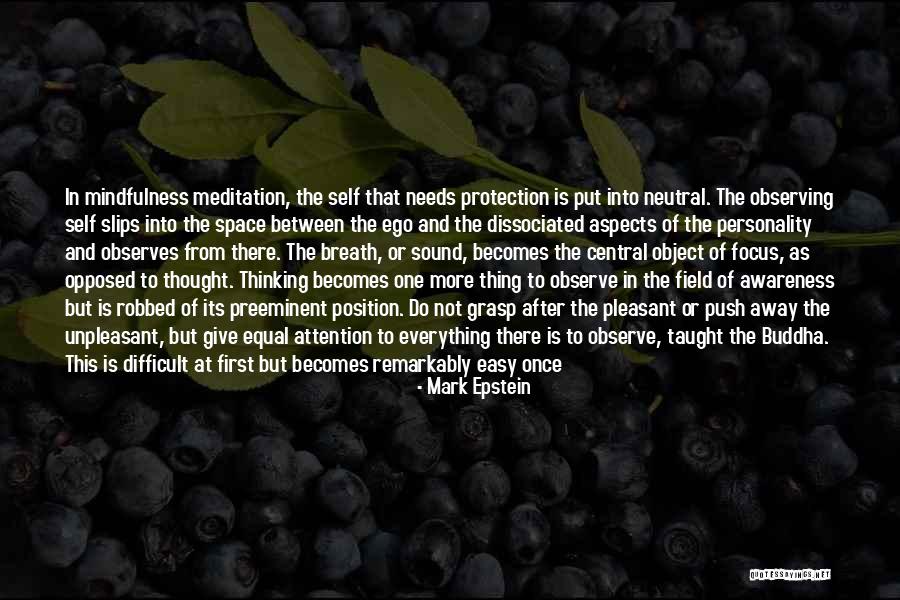
In mindfulness meditation, the self that needs protection is put into neutral. The observing self slips into the space between the ego and the dissociated aspects of the personality and observes from there. The breath, or sound, becomes the central object of focus, as opposed to thought. Thinking becomes one more thing to observe in the field of awareness but is robbed of its preeminent position. Do not grasp after the pleasant or push away the unpleasant, but give equal attention to everything there is to observe, taught the Buddha. This is difficult at first but becomes remarkably easy once one gets the hang of it. One learns first to bring one's attention to the neutral object and then to relax into a state of choiceless awareness rather than always trying to maintain control. As the ego's position is weakened, waking life takes on aspects of dream life to the extent that new surprises keep unexpectedly emerging. — Mark Epstein
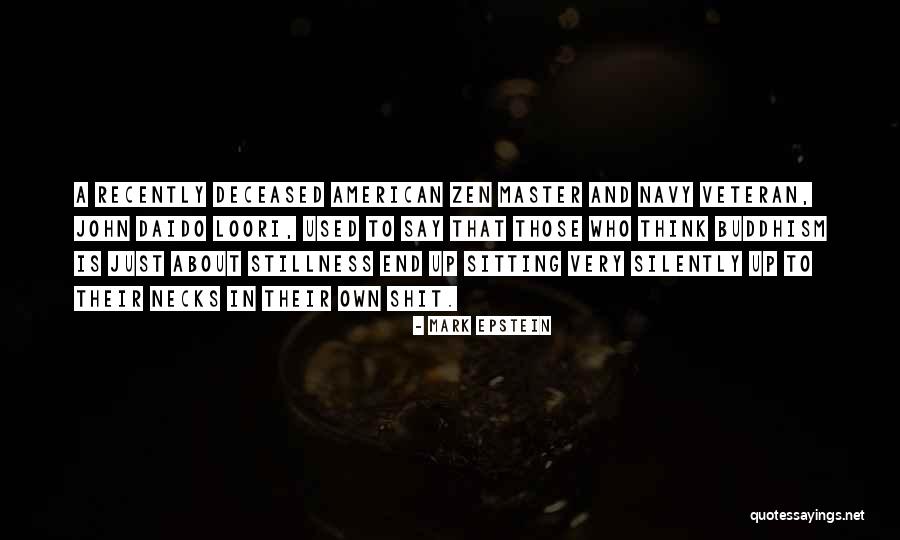
A recently deceased American Zen master and navy veteran, John Daido Loori, used to say that those who think Buddhism is just about stillness end up sitting very silently up to their necks in their own shit. — Mark Epstein
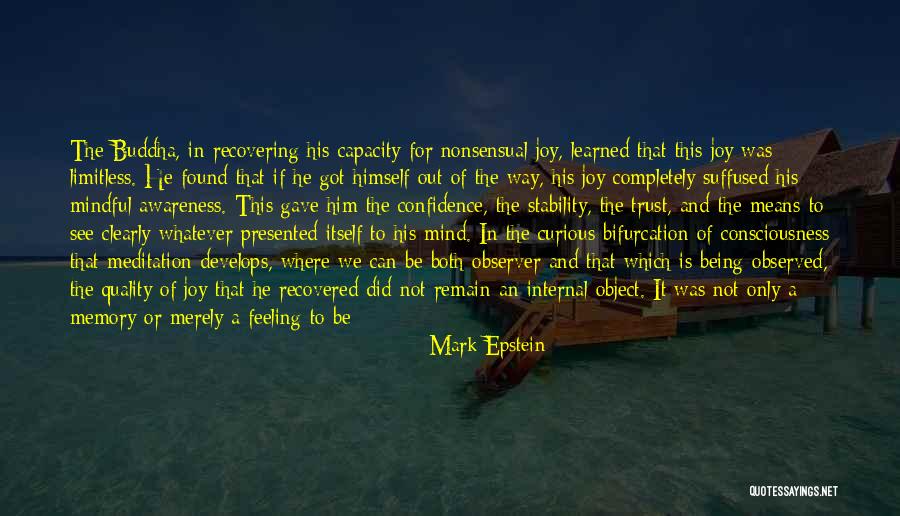
The Buddha, in recovering his capacity for nonsensual joy, learned that this joy was limitless. He found that if he got himself out of the way, his joy completely suffused his mindful awareness. This gave him the confidence, the stability, the trust, and the means to see clearly whatever presented itself to his mind. In the curious bifurcation of consciousness that meditation develops, where we can be both observer and that which is being observed, the quality of joy that he recovered did not remain an internal object. It was not only a memory or merely a feeling to be observed; it was also a quality of mind that could accompany every moment of mindfulness. The more he accepted the presence of this feeling and the more it toggled between being object and subject, the closer the Buddha came to understanding his true nature. — Mark Epstein
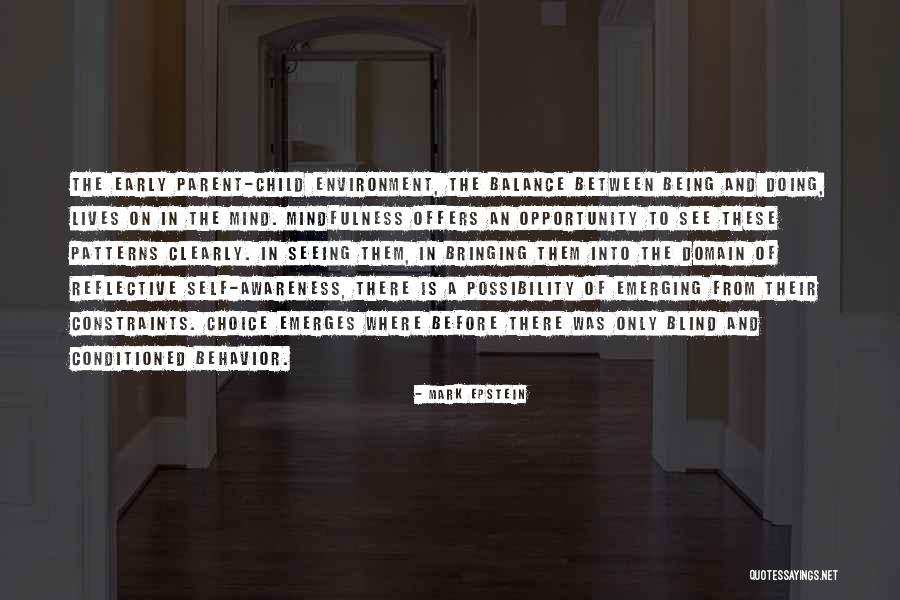
The early parent-child environment, the balance between being and doing, lives on in the mind. Mindfulness offers an opportunity to see these patterns clearly. In seeing them, in bringing them into the domain of reflective self-awareness, there is a possibility of emerging from their constraints. Choice emerges where before there was only blind and conditioned behavior. — Mark Epstein
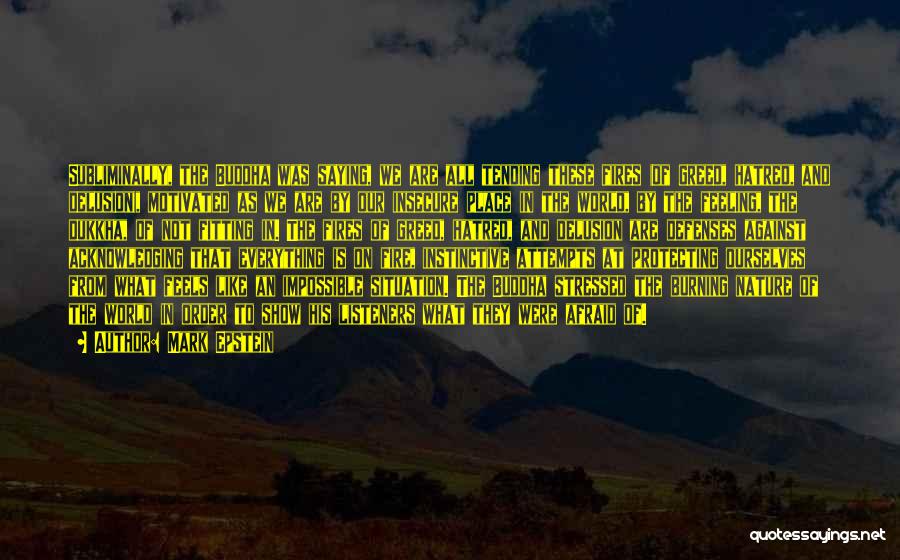
Subliminally, the Buddha was saying, we are all tending these fires (of greed, hatred, and delusion), motivated as we are by our insecure place in the world, by the feeling, the dukkha, of not fitting in. The fires of greed, hatred, and delusion are defenses against acknowledging that everything is on fire, instinctive attempts at protecting ourselves from what feels like an impossible situation. The Buddha stressed the burning nature of the world in order to show his listeners what they were afraid of. — Mark Epstein
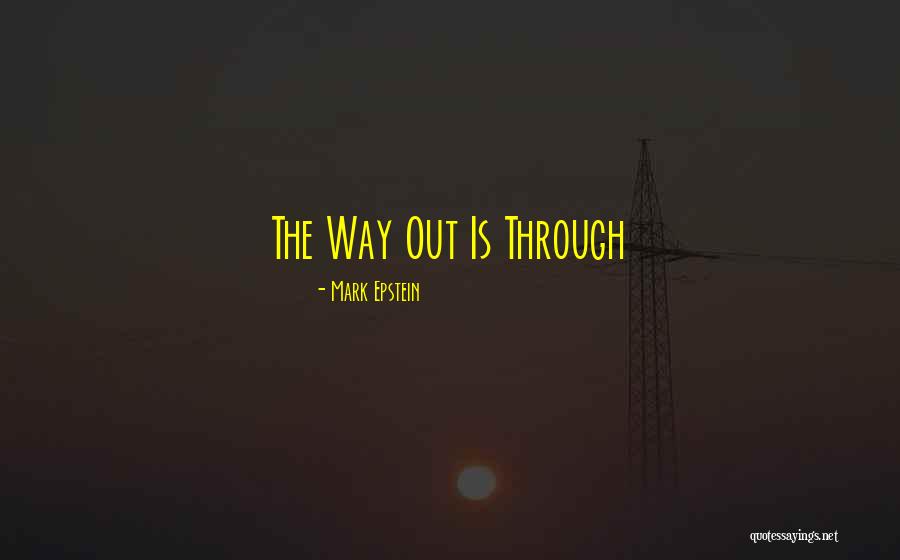
The Way Out Is Through — Mark Epstein
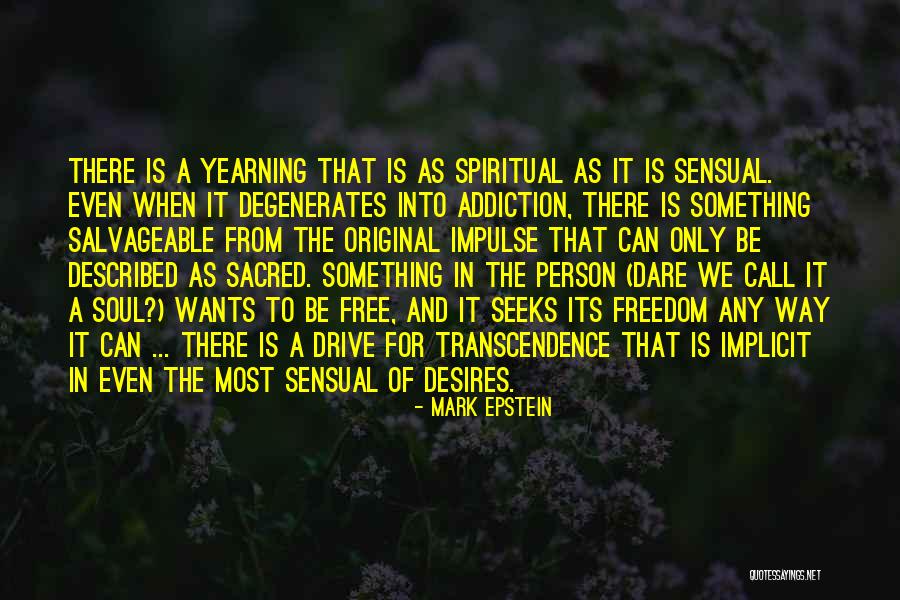
There is a yearning that is as spiritual as it is sensual. Even when it degenerates into addiction, there is something salvageable from the original impulse that can only be described as sacred. Something in the person (dare we call it a soul?) wants to be free, and it seeks its freedom any way it can ... There is a drive for transcendence that is implicit in even the most sensual of desires. — Mark Epstein
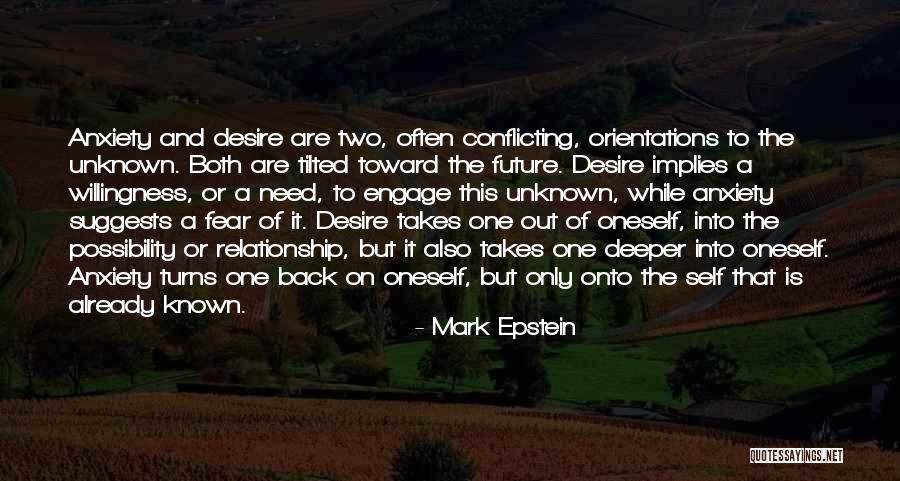
Anxiety and desire are two, often conflicting, orientations to the unknown. Both are tilted toward the future. Desire implies a willingness, or a need, to engage this unknown, while anxiety suggests a fear of it. Desire takes one out of oneself, into the possibility or relationship, but it also takes one deeper into oneself. Anxiety turns one back on oneself, but only onto the self that is already known. — Mark Epstein
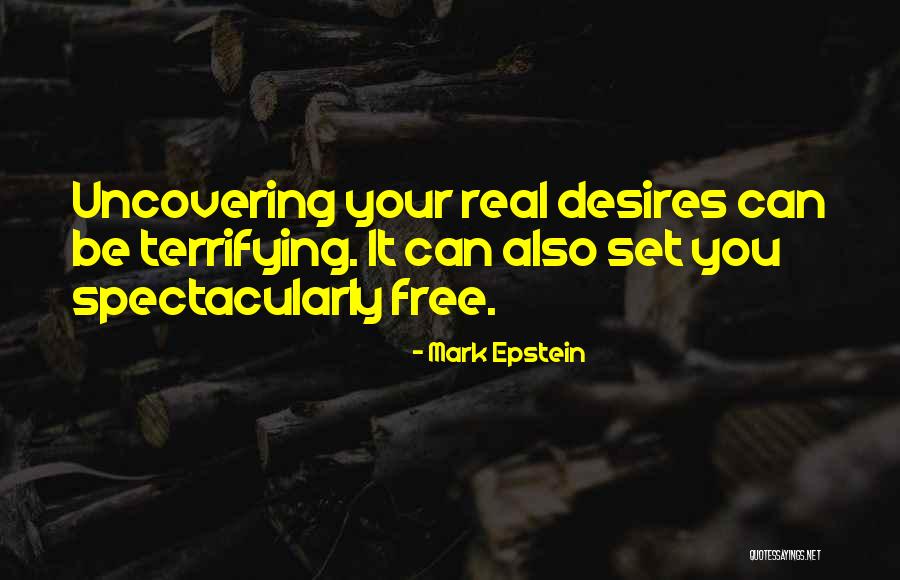
Uncovering your real desires can be terrifying. It can also set you spectacularly free. — Mark Epstein
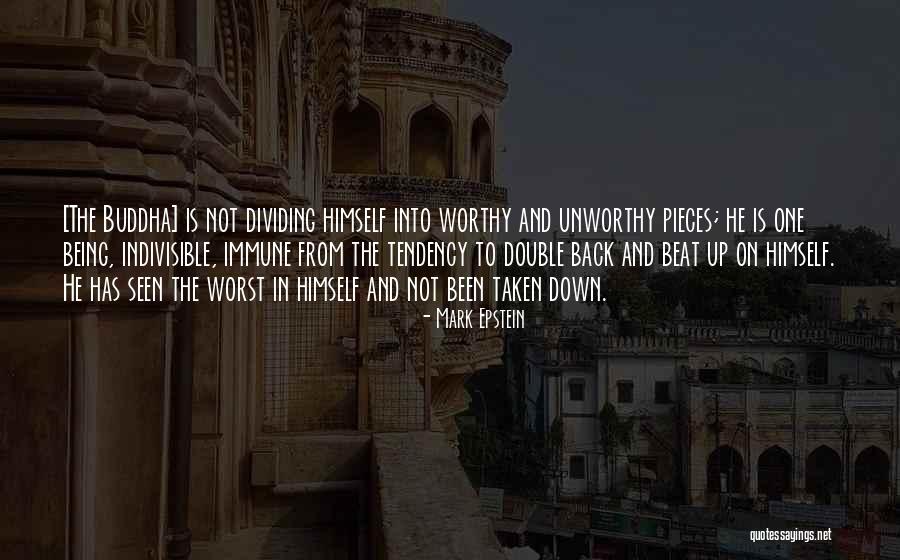
[The Buddha] is not dividing himself into worthy and unworthy pieces; he is one being, indivisible, immune from the tendency to double back and beat up on himself. He has seen the worst in himself and not been taken down. — Mark Epstein
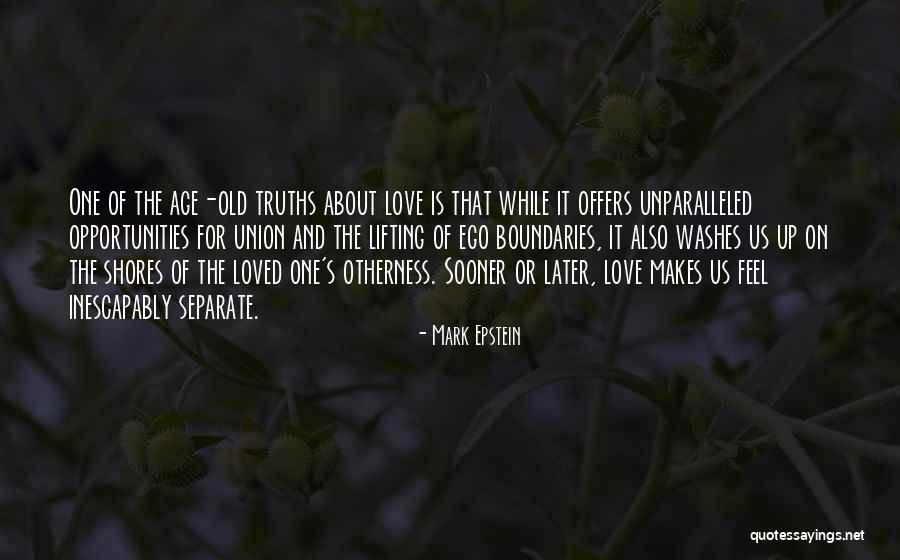
One of the age-old truths about love is that while it offers unparalleled opportunities for union and the lifting of ego boundaries, it also washes us up on the shores of the loved one's otherness. Sooner or later, love makes us feel inescapably separate. — Mark Epstein
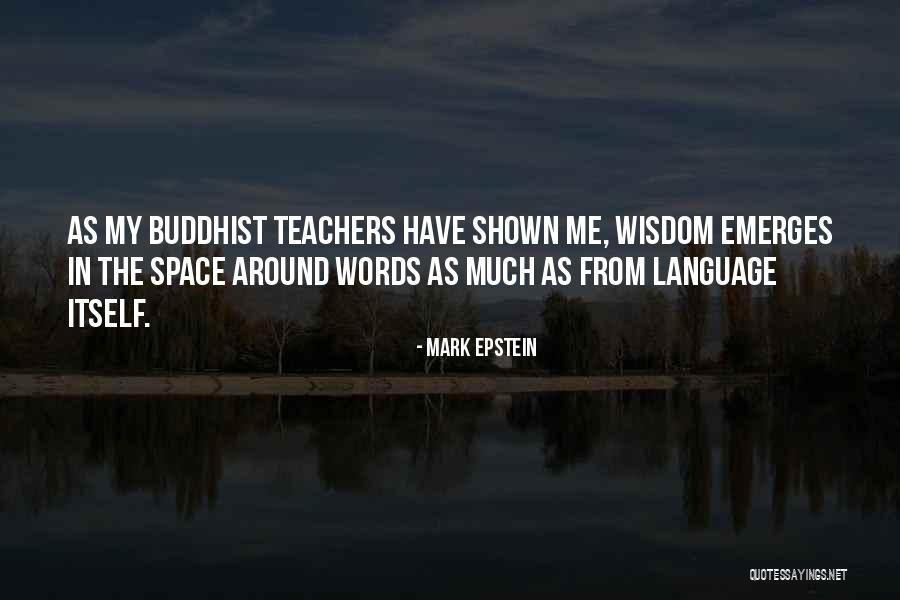
As my Buddhist teachers have shown me, wisdom emerges in the space around words as much as from language itself. — Mark Epstein
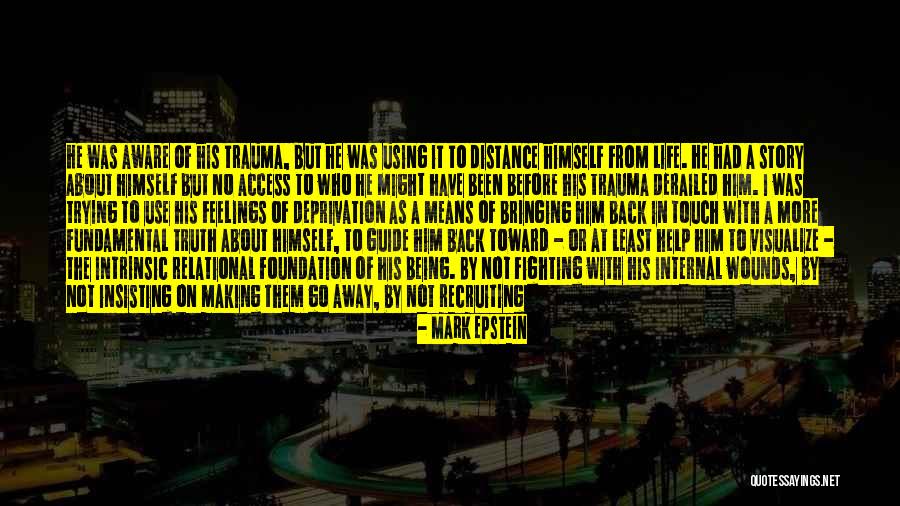
He was aware of his trauma, but he was using it to distance himself from life. He had a story about himself but no access to who he might have been before his trauma derailed him. I was trying to use his feelings of deprivation as a means of bringing him back in touch with a more fundamental truth about himself, to guide him back toward - or at least help him to visualize - the intrinsic relational foundation of his being. By not fighting with his internal wounds, by not insisting on making them go away, by not recruiting everyone in his intimate life to save him from his feelings of abandonment, by simply resting with them the way we do in meditation, he could learn, as the Buddha did, that he already was the love he thought he lacked. — Mark Epstein
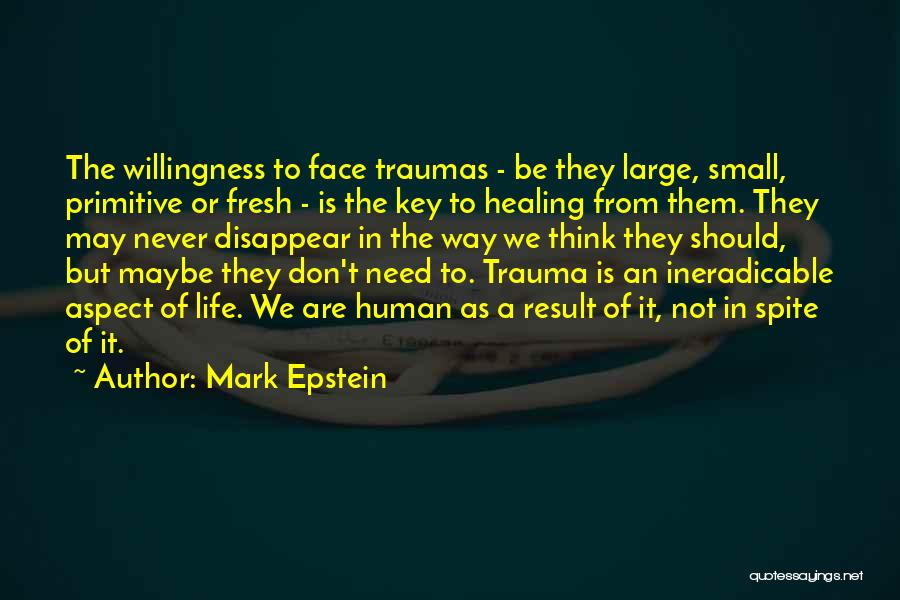
The willingness to face traumas - be they large, small, primitive or fresh - is the key to healing from them. They may never disappear in the way we think they should, but maybe they don't need to. Trauma is an ineradicable aspect of life. We are human as a result of it, not in spite of it. — Mark Epstein
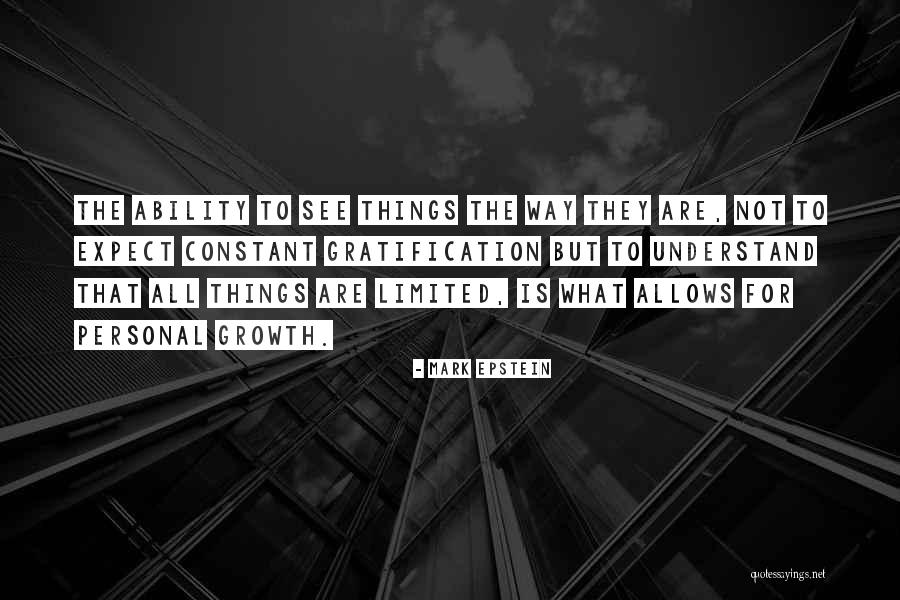
The ability to see things the way they are, not to expect constant gratification but to understand that all things are limited, is what allows for personal growth. — Mark Epstein
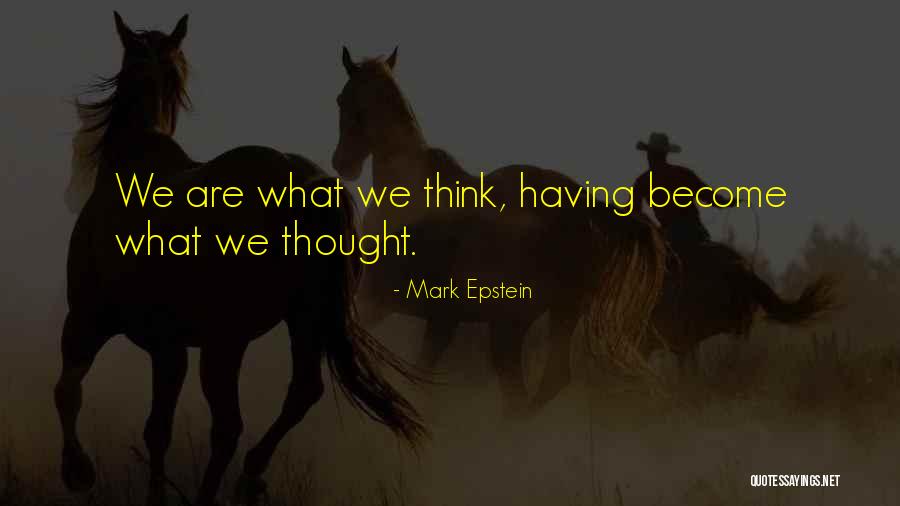
We are what we think, having become what we thought. — Mark Epstein
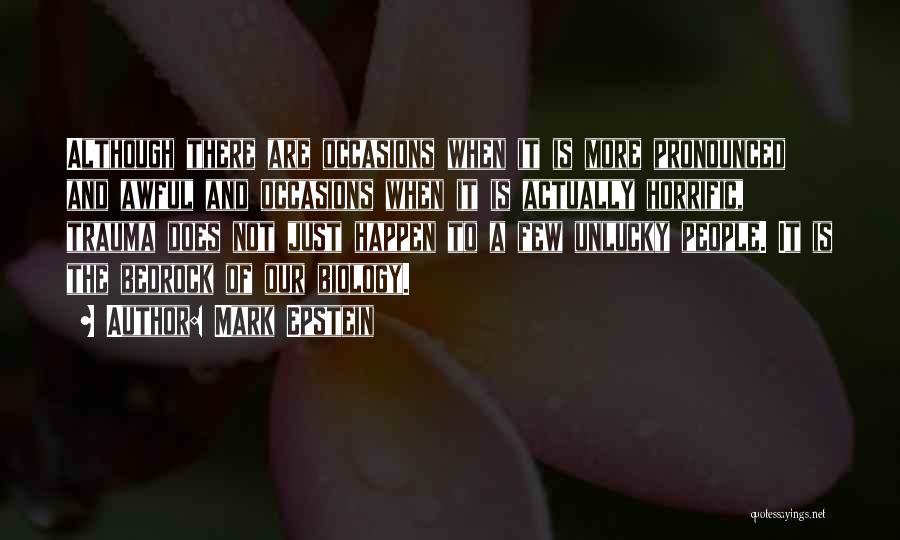
Although there are occasions when it is more pronounced and awful and occasions when it is actually horrific, trauma does not just happen to a few unlucky people. It is the bedrock of our biology. — Mark Epstein
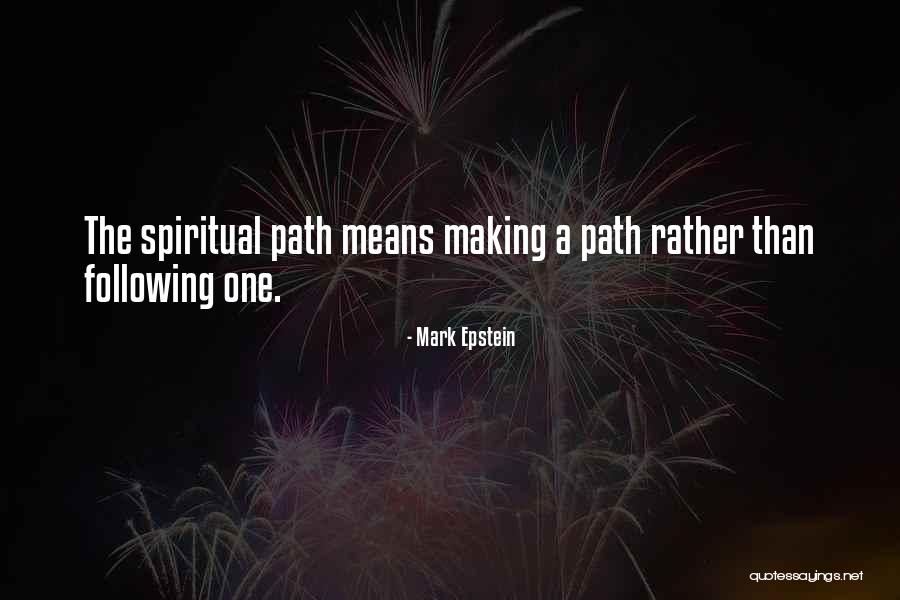
The spiritual path means making a path rather than following one. — Mark Epstein
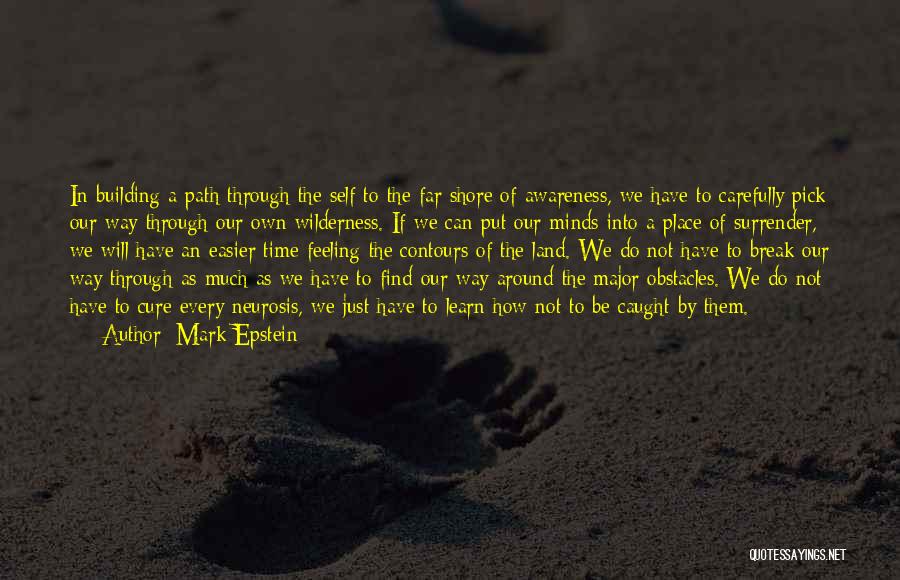
In building a path through the self to the far shore of awareness, we have to carefully pick our way through our own wilderness. If we can put our minds into a place of surrender, we will have an easier time feeling the contours of the land. We do not have to break our way through as much as we have to find our way around the major obstacles. We do not have to cure every neurosis, we just have to learn how not to be caught by them. — Mark Epstein
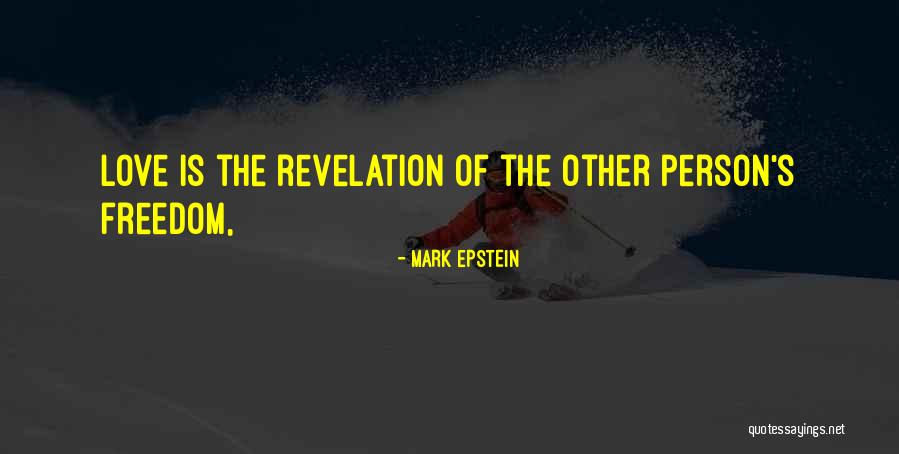
Love is the revelation of the other person's freedom, — Mark Epstein
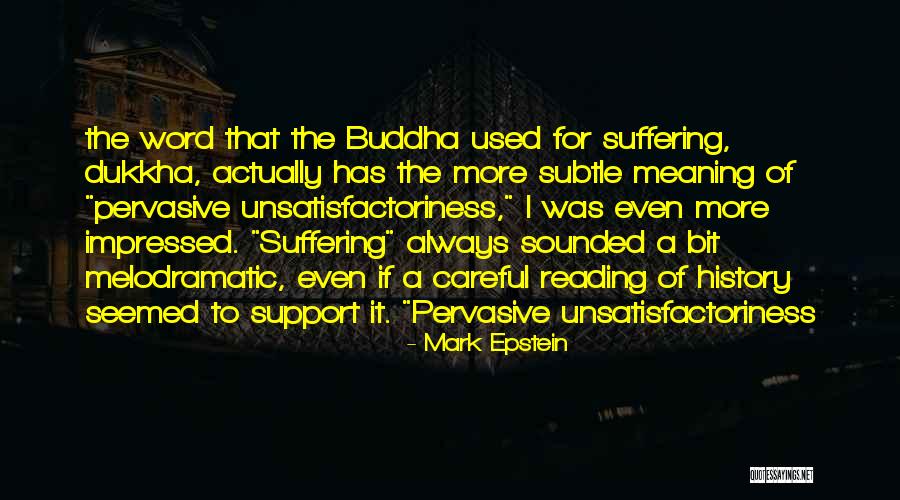
the word that the Buddha used for suffering, dukkha, actually has the more subtle meaning of "pervasive unsatisfactoriness," I was even more impressed. "Suffering" always sounded a bit melodramatic, even if a careful reading of history seemed to support it. "Pervasive unsatisfactoriness — Mark Epstein
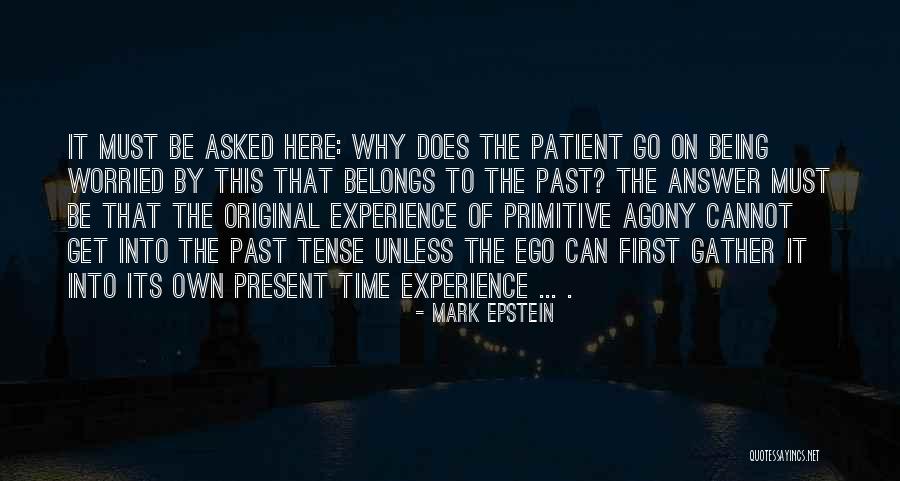
It must be asked here: why does the patient go on being worried by this that belongs to the past? The answer must be that the original experience of primitive agony cannot get into the past tense unless the ego can first gather it into its own present time experience ... . — Mark Epstein
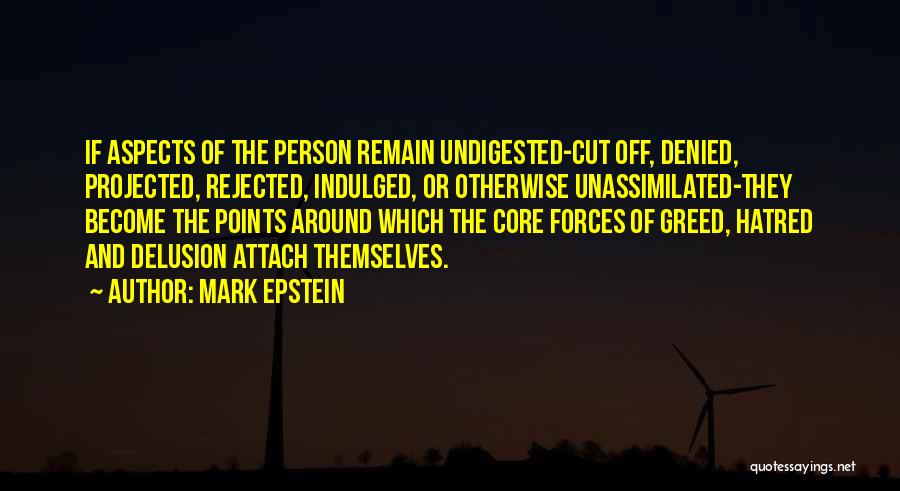
If aspects of the person remain undigested-cut off, denied, projected, rejected, indulged, or otherwise unassimilated-they become the points around which the core forces of greed, hatred and delusion attach themselves. — Mark Epstein
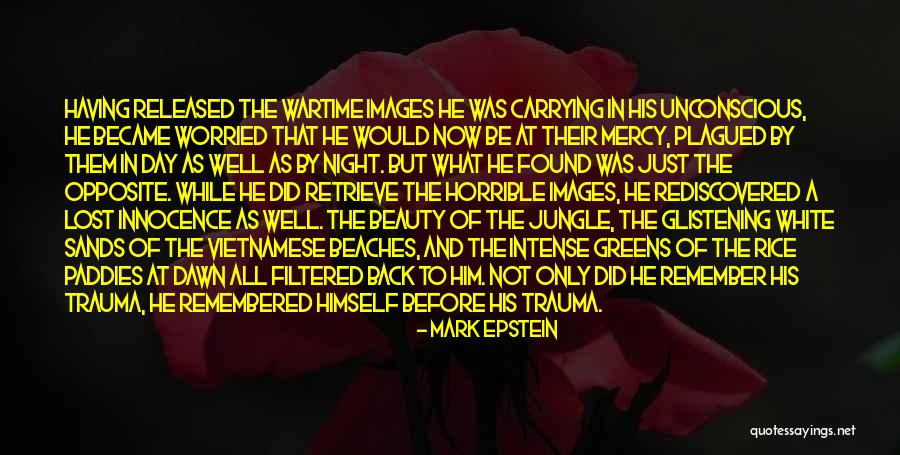
Having released the wartime images he was carrying in his unconscious, he became worried that he would now be at their mercy, plagued by them in day as well as by night. But what he found was just the opposite. While he did retrieve the horrible images, he rediscovered a lost innocence as well. The beauty of the jungle, the glistening white sands of the Vietnamese beaches, and the intense greens of the rice paddies at dawn all filtered back to him. Not only did he remember his trauma, he remembered himself before his trauma. — Mark Epstein
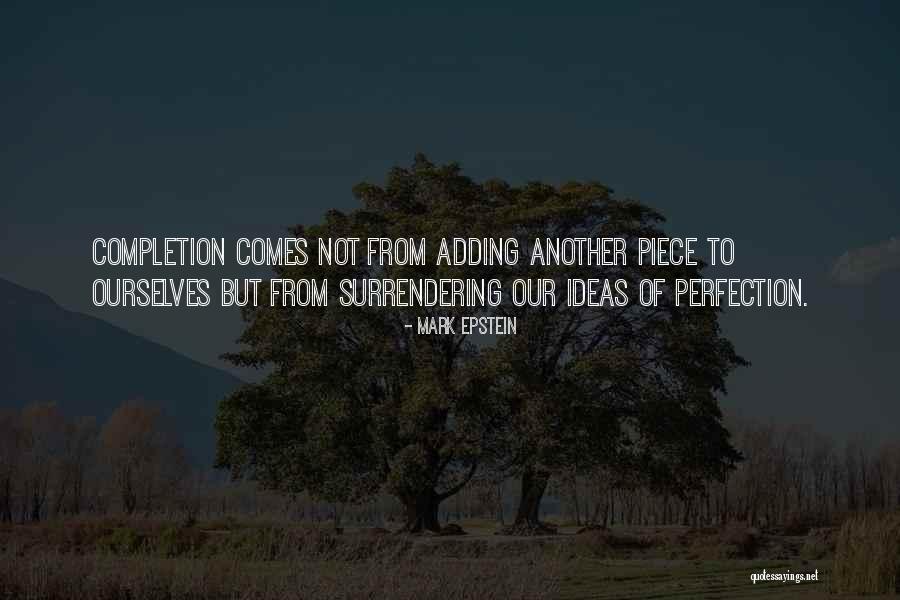
Completion comes not from adding another piece to ourselves but from surrendering our ideas of perfection. — Mark Epstein
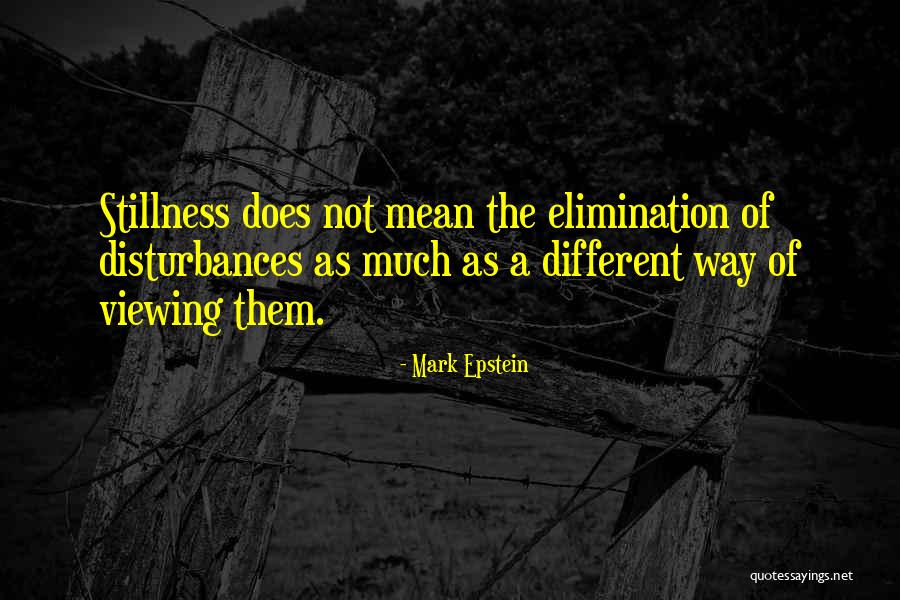
Stillness does not mean the elimination of disturbances as much as a different way of viewing them. — Mark Epstein
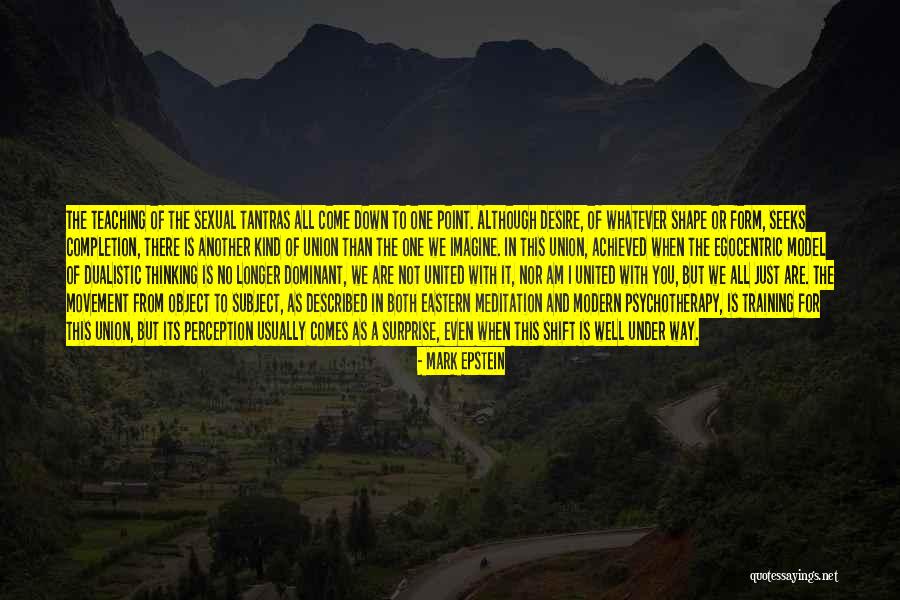
The teaching of the sexual tantras all come down to one point. Although desire, of whatever shape or form, seeks completion, there is another kind of union than the one we imagine. In this union, achieved when the egocentric model of dualistic thinking is no longer dominant, we are not united with it, nor am I united with you, but we all just are. The movement from object to subject, as described in both Eastern meditation and modern psychotherapy, is training for this union, but its perception usually comes as a surprise, even when this shift is well under way. It is a kind of grace. The emphasis on sexual relations in the tantric teachings make it clear that the ecstatic surprise of orgasm is the best approximation of this grace. — Mark Epstein
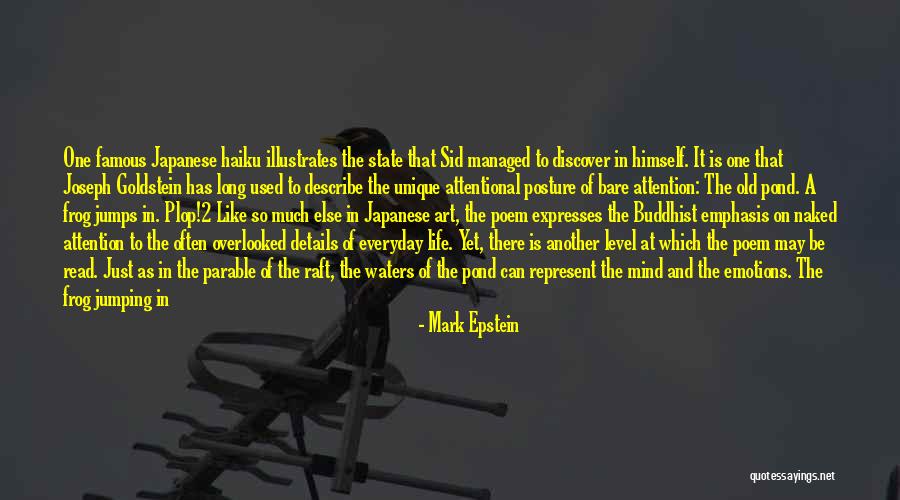
One famous Japanese haiku illustrates the state that Sid managed to discover in himself. It is one that Joseph Goldstein has long used to describe the unique attentional posture of bare attention: The old pond. A frog jumps in. Plop!2 Like so much else in Japanese art, the poem expresses the Buddhist emphasis on naked attention to the often overlooked details of everyday life. Yet, there is another level at which the poem may be read. Just as in the parable of the raft, the waters of the pond can represent the mind and the emotions. The frog jumping in becomes a thought or feeling arising in the mind or body, while "Plop!" represents the reverberations of that thought or feeling, unelaborated by the forces of reactivity. The entire poem comes to evoke the state of bare attention in its utter simplicity. — Mark Epstein
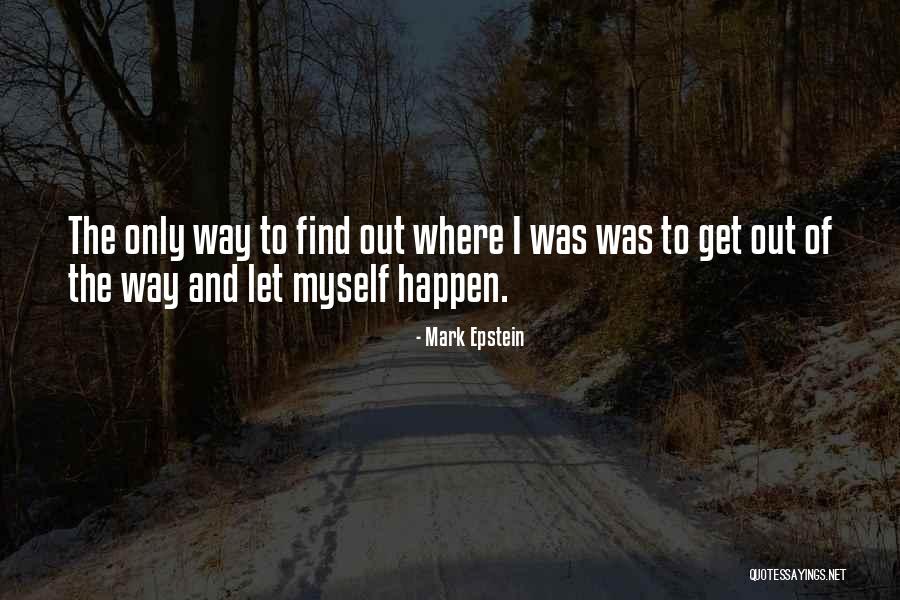
The only way to find out where I was was to get out of the way and let myself happen. — Mark Epstein
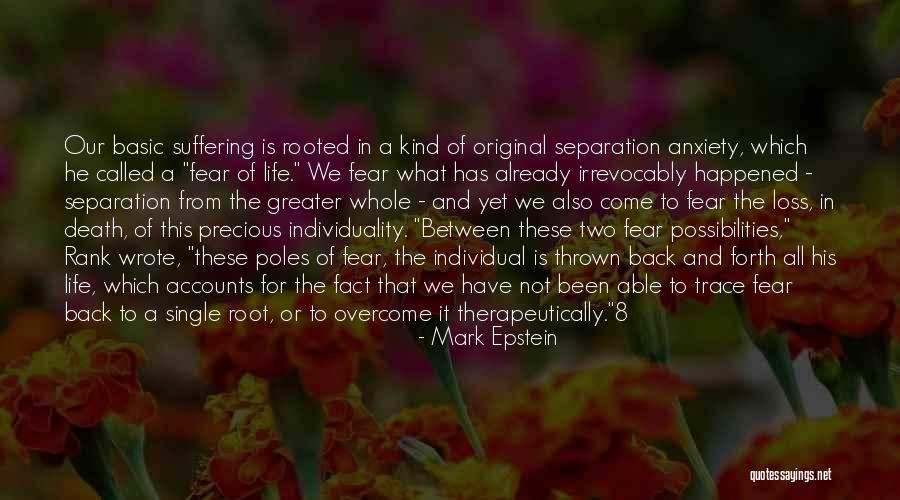
Our basic suffering is rooted in a kind of original separation anxiety, which he called a "fear of life." We fear what has already irrevocably happened - separation from the greater whole - and yet we also come to fear the loss, in death, of this precious individuality. "Between these two fear possibilities," Rank wrote, "these poles of fear, the individual is thrown back and forth all his life, which accounts for the fact that we have not been able to trace fear back to a single root, or to overcome it therapeutically."8 — Mark Epstein
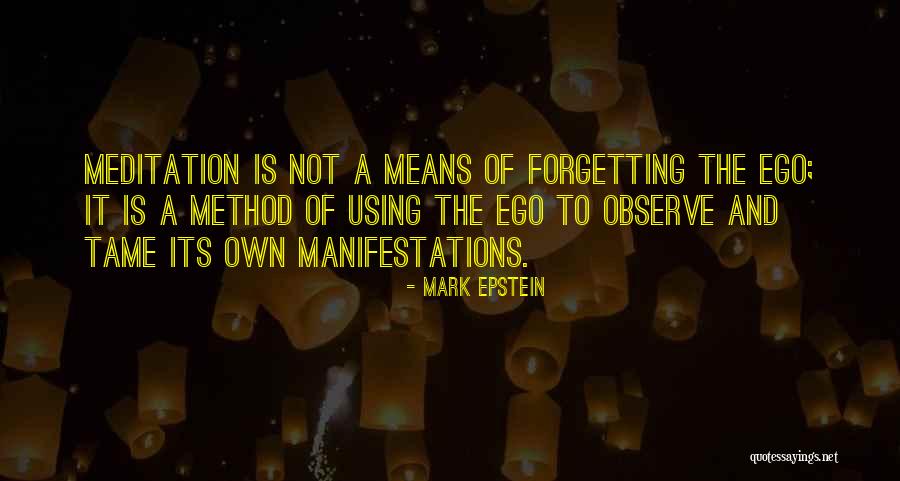
Meditation is not a means of forgetting the ego; it is a method of using the ego to observe and tame its own manifestations. — Mark Epstein
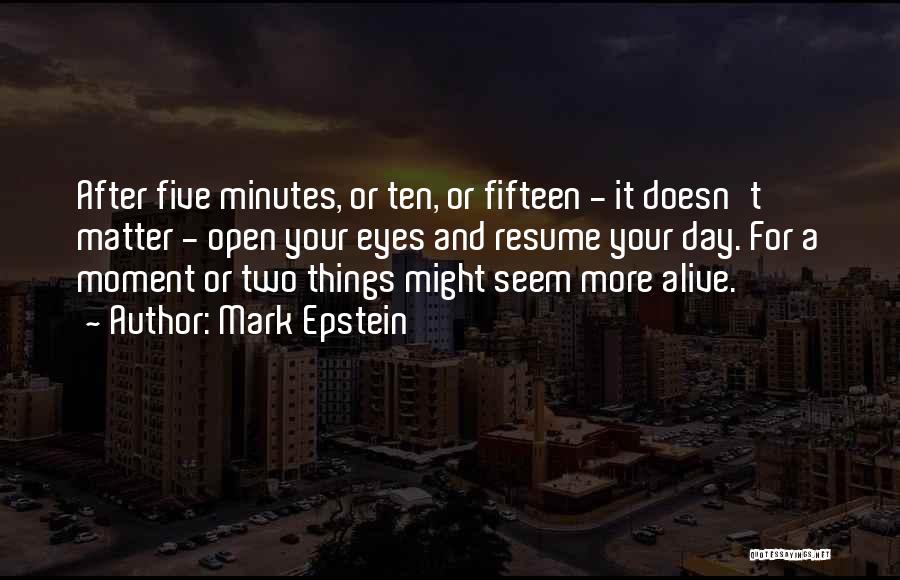
After five minutes, or ten, or fifteen - it doesn't matter - open your eyes and resume your day. For a moment or two things might seem more alive. — Mark Epstein
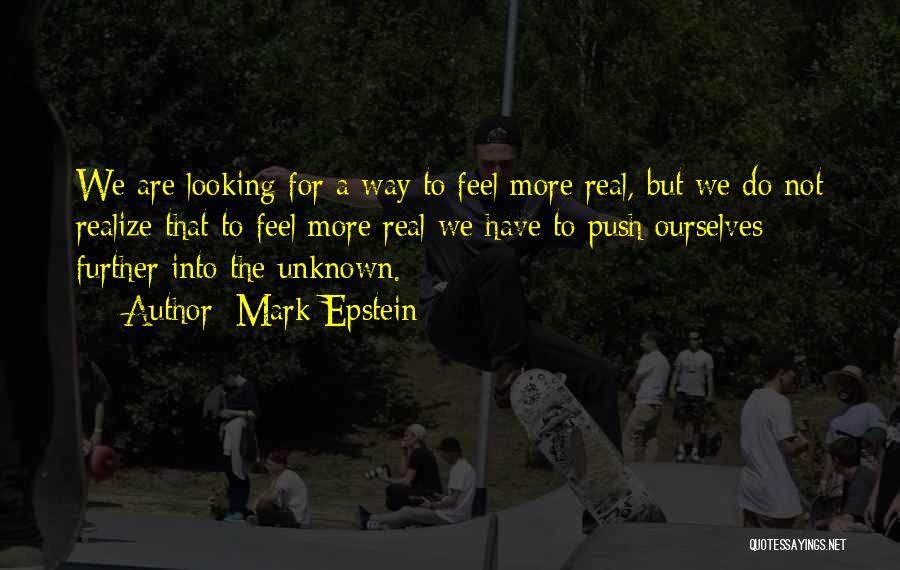
We are looking for a way to feel more real, but we do not realize that to feel more real we have to push ourselves further into the unknown. — Mark Epstein
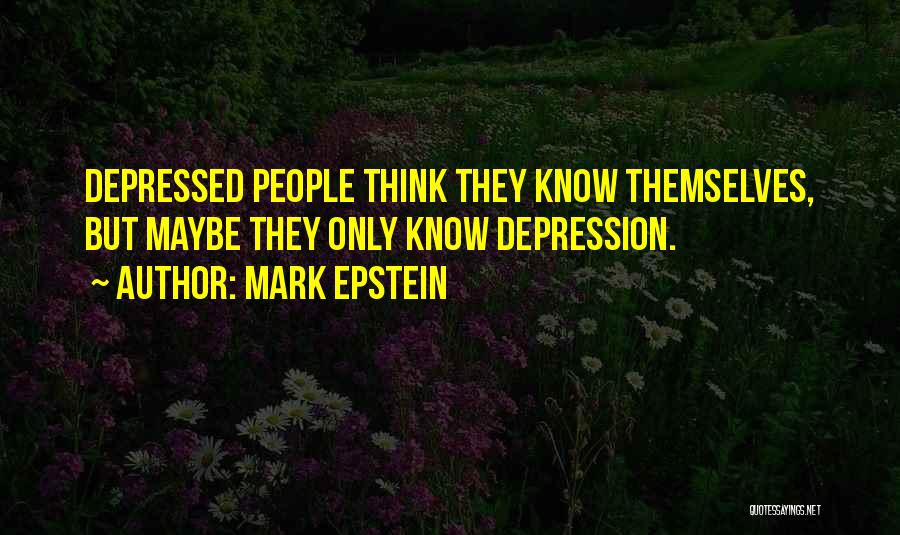
Depressed people think they know themselves, but maybe they only know depression. — Mark Epstein
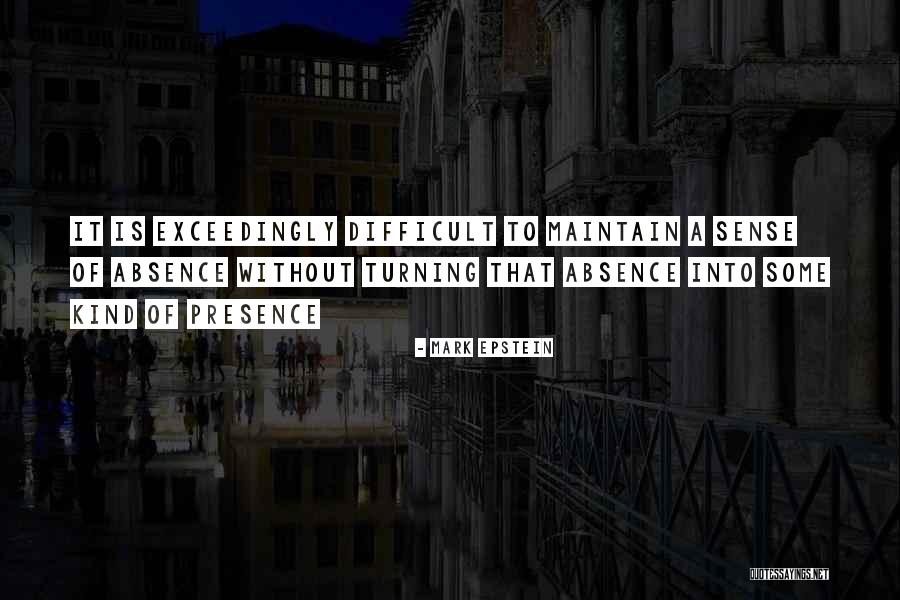
It is exceedingly difficult to maintain a sense of absence without turning that absence into some kind of presence — Mark Epstein
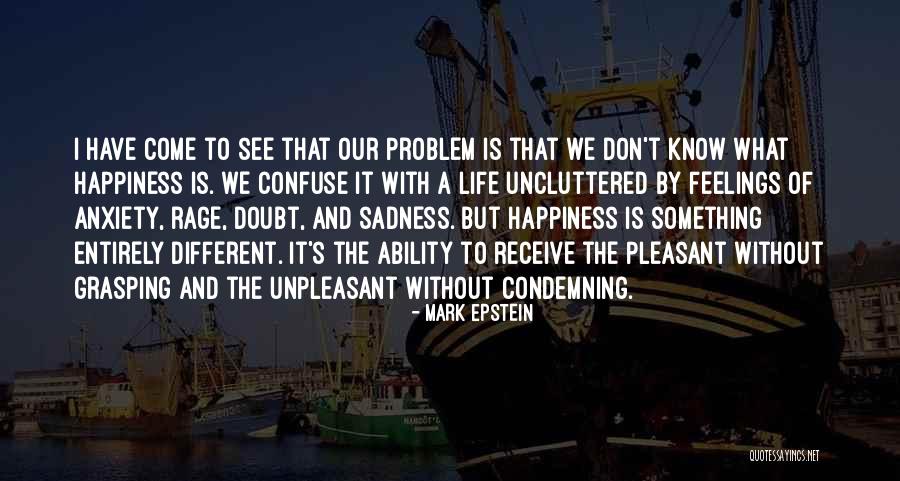
I have come to see that our problem is that we don't know what happiness is. We confuse it with a life uncluttered by feelings of anxiety, rage, doubt, and sadness. But happiness is something entirely different. It's the ability to receive the pleasant without grasping and the unpleasant without condemning. — Mark Epstein
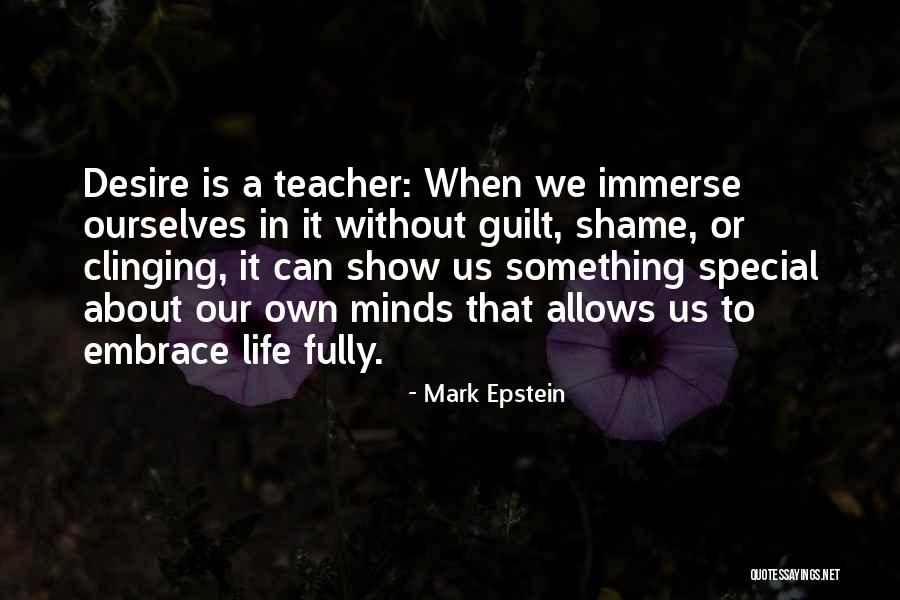
Desire is a teacher: When we immerse ourselves in it without guilt, shame, or clinging, it can show us something special about our own minds that allows us to embrace life fully. — Mark Epstein
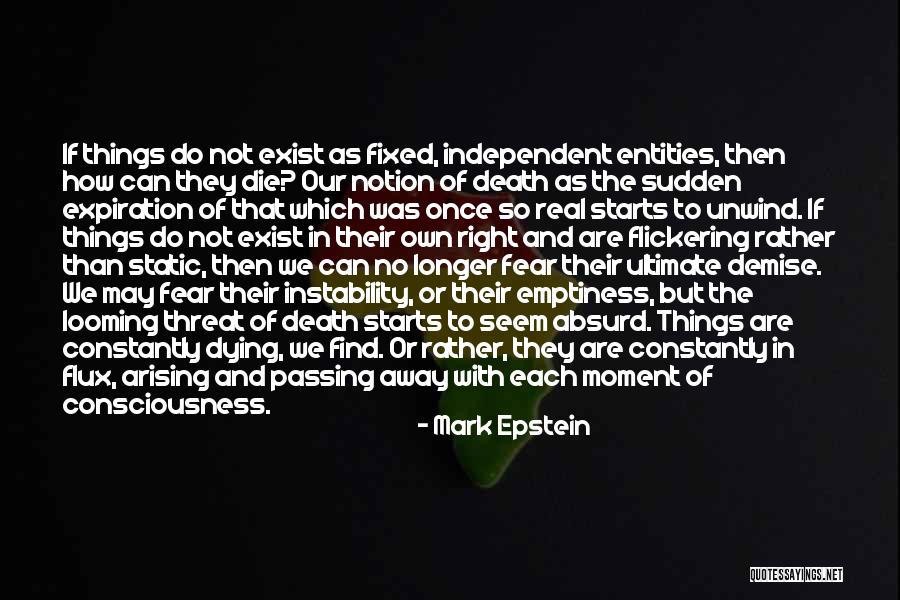
If things do not exist as fixed, independent entities, then how can they die? Our notion of death as the sudden expiration of that which was once so real starts to unwind. If things do not exist in their own right and are flickering rather than static, then we can no longer fear their ultimate demise. We may fear their instability, or their emptiness, but the looming threat of death starts to seem absurd. Things are constantly dying, we find. Or rather, they are constantly in flux, arising and passing away with each moment of consciousness. — Mark Epstein
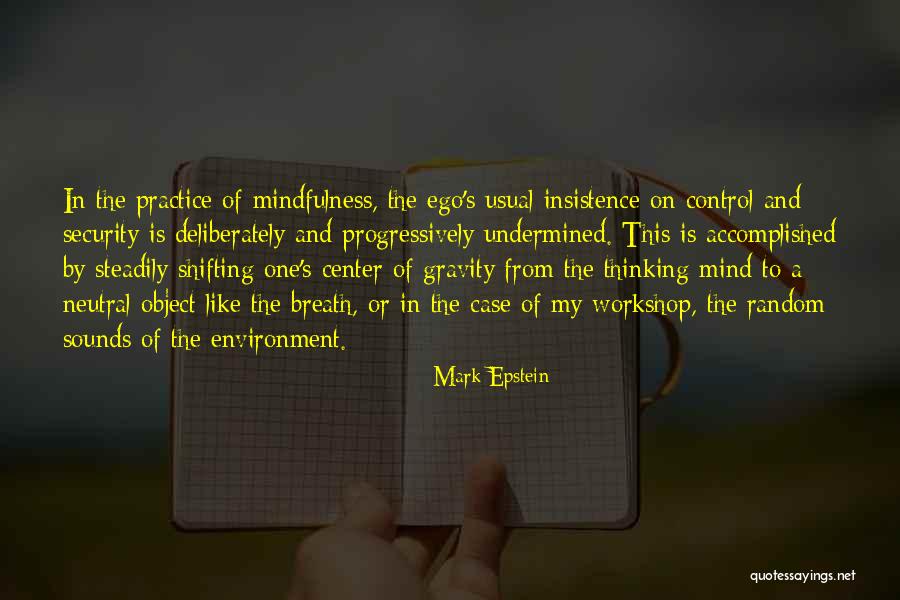
In the practice of mindfulness, the ego's usual insistence on control and security is deliberately and progressively undermined. This is accomplished by steadily shifting one's center of gravity from the thinking mind to a neutral object like the breath, or in the case of my workshop, the random sounds of the environment. — Mark Epstein
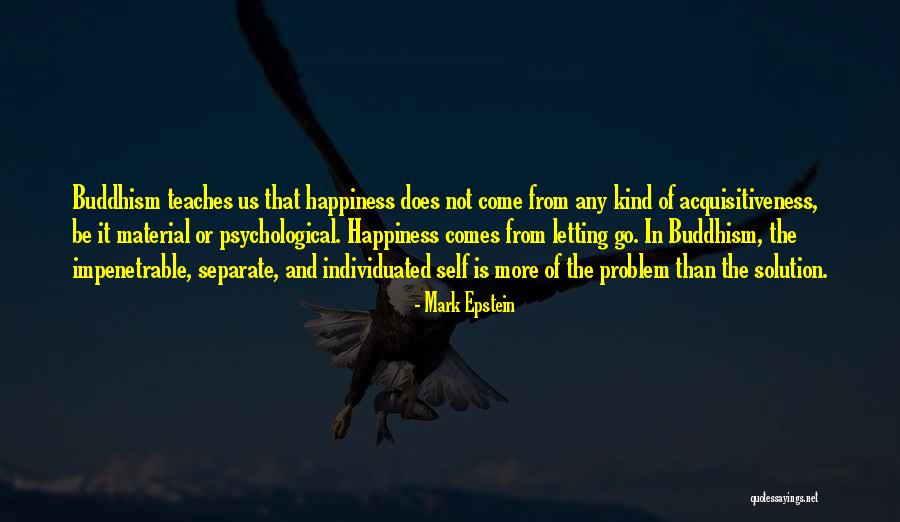
Buddhism teaches us that happiness does not come from any kind of acquisitiveness, be it material or psychological. Happiness comes from letting go. In Buddhism, the impenetrable, separate, and individuated self is more of the problem than the solution. — Mark Epstein
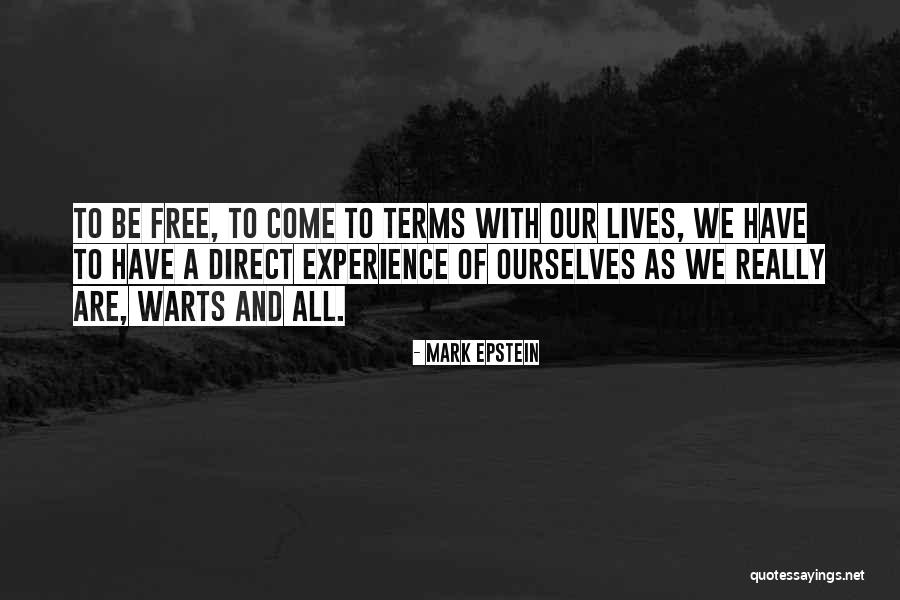
To be free, to come to terms with our lives, we have to have a direct experience of ourselves as we really are, warts and all. — Mark Epstein
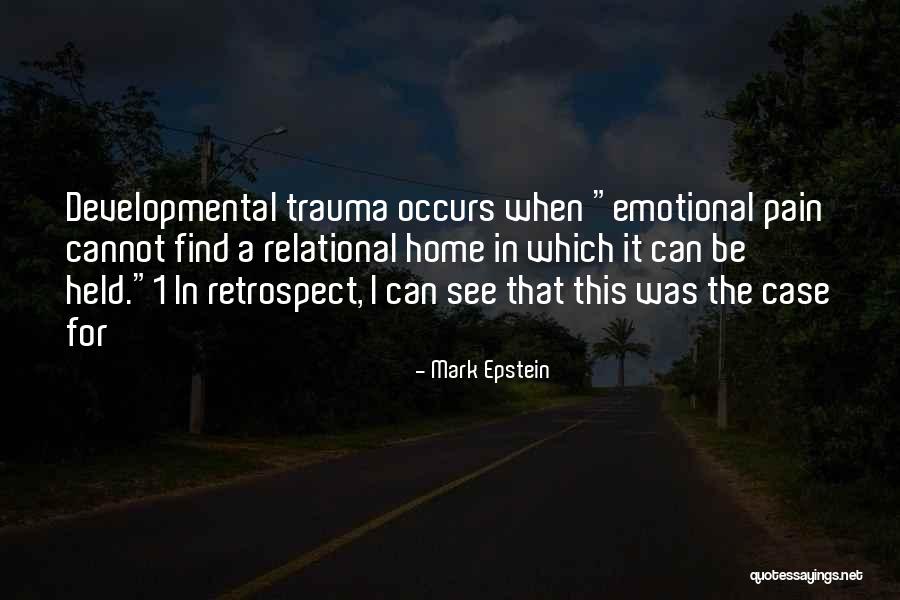
Developmental trauma occurs when "emotional pain cannot find a relational home in which it can be held."1 In retrospect, I can see that this was the case for — Mark Epstein
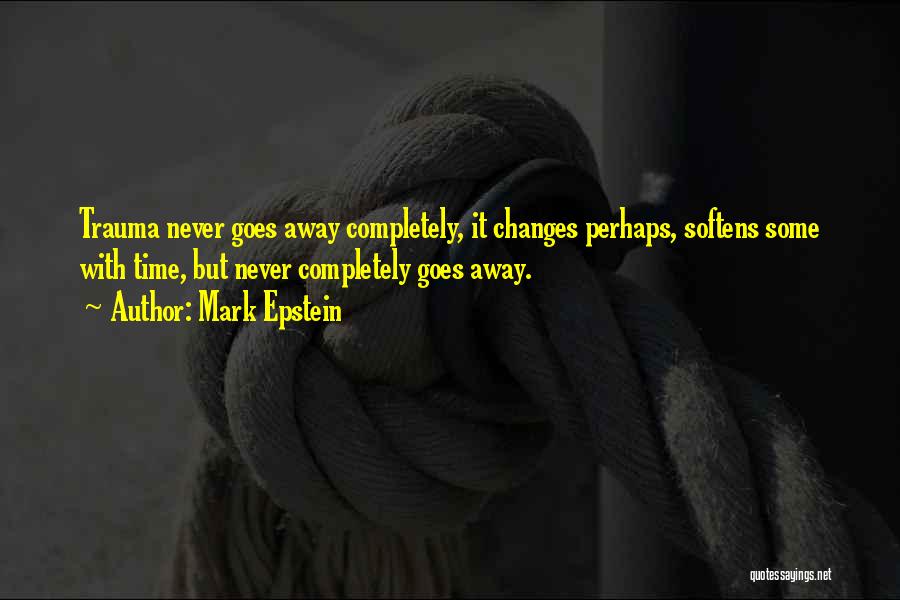
Trauma never goes away completely, it changes perhaps, softens some with time, but never completely goes away. — Mark Epstein
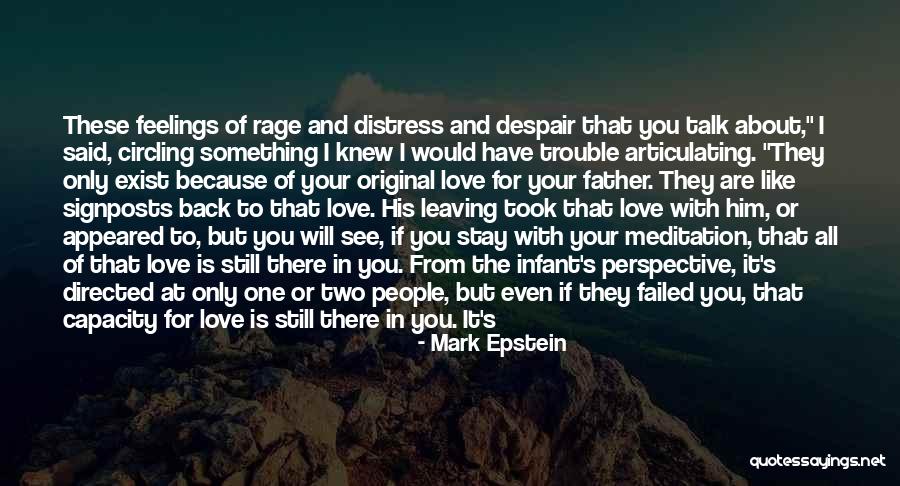
These feelings of rage and distress and despair that you talk about," I said, circling something I knew I would have trouble articulating. "They only exist because of your original love for your father. They are like signposts back to that love. His leaving took that love with him, or appeared to, but you will see, if you stay with your meditation, that all of that love is still there in you. From the infant's perspective, it's directed at only one or two people, but even if they failed you, that capacity for love is still there in you. It's too bad for your father that he didn't get to know it - but there are plenty of people now who will be grateful for it. There's a whole roomful right here. — Mark Epstein
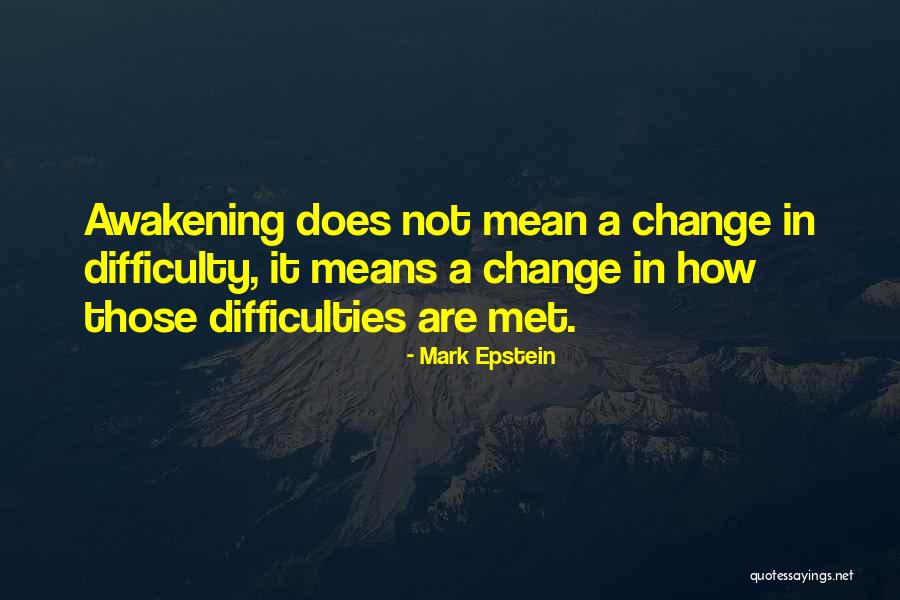
Awakening does not mean a change in difficulty, it means a change in how those difficulties are met. — Mark Epstein
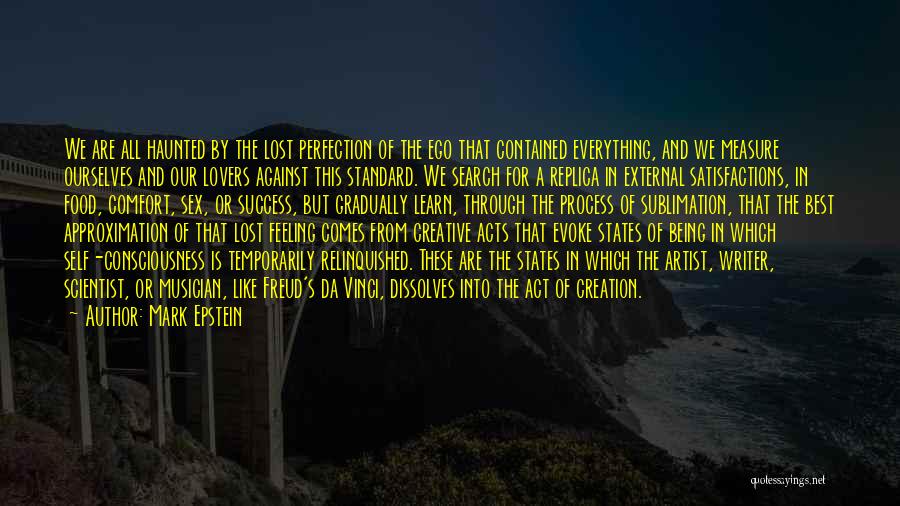
We are all haunted by the lost perfection of the ego that contained everything, and we measure ourselves and our lovers against this standard. We search for a replica in external satisfactions, in food, comfort, sex, or success, but gradually learn, through the process of sublimation, that the best approximation of that lost feeling comes from creative acts that evoke states of being in which self-consciousness is temporarily relinquished. These are the states in which the artist, writer, scientist, or musician, like Freud's da Vinci, dissolves into the act of creation. — Mark Epstein
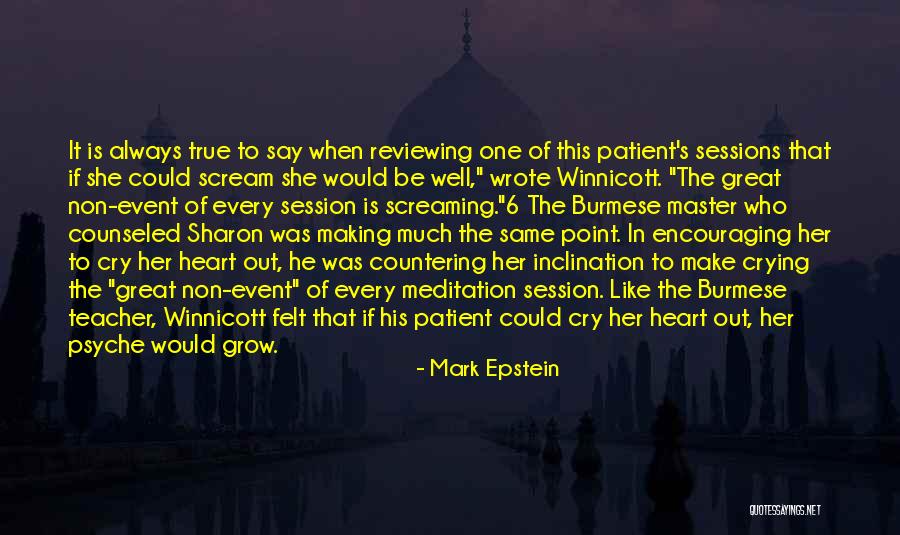
It is always true to say when reviewing one of this patient's sessions that if she could scream she would be well," wrote Winnicott. "The great non-event of every session is screaming."6 The Burmese master who counseled Sharon was making much the same point. In encouraging her to cry her heart out, he was countering her inclination to make crying the "great non-event" of every meditation session. Like the Burmese teacher, Winnicott felt that if his patient could cry her heart out, her psyche would grow. — Mark Epstein






